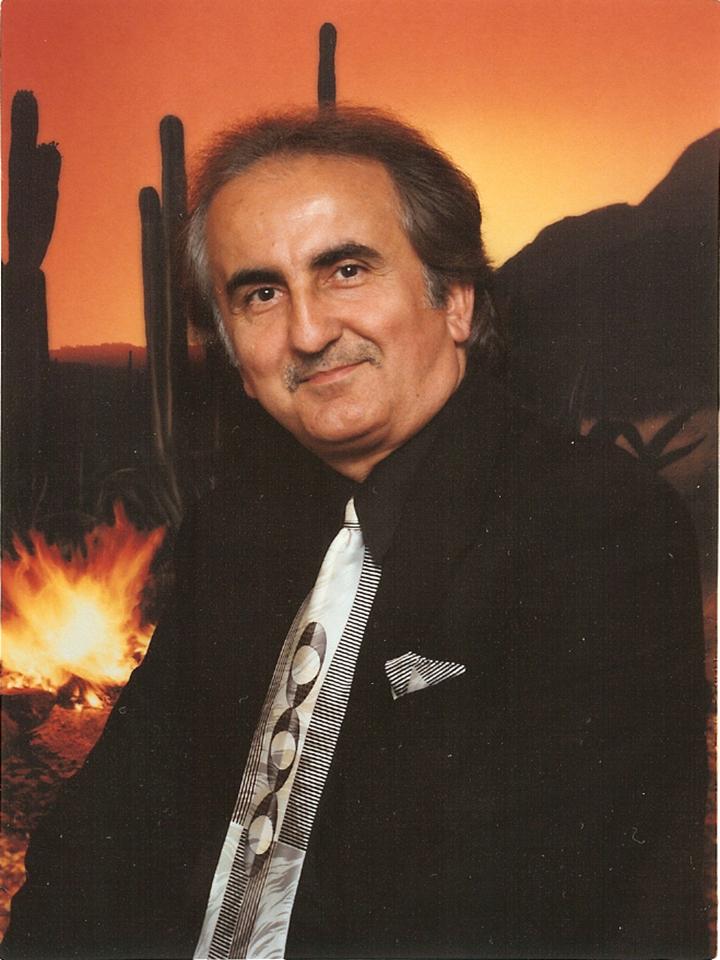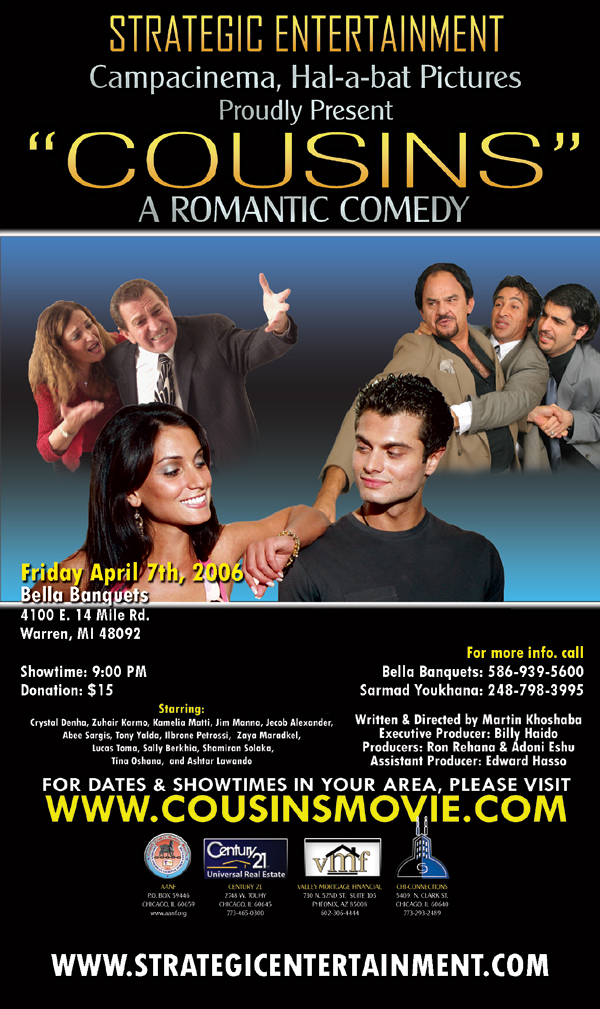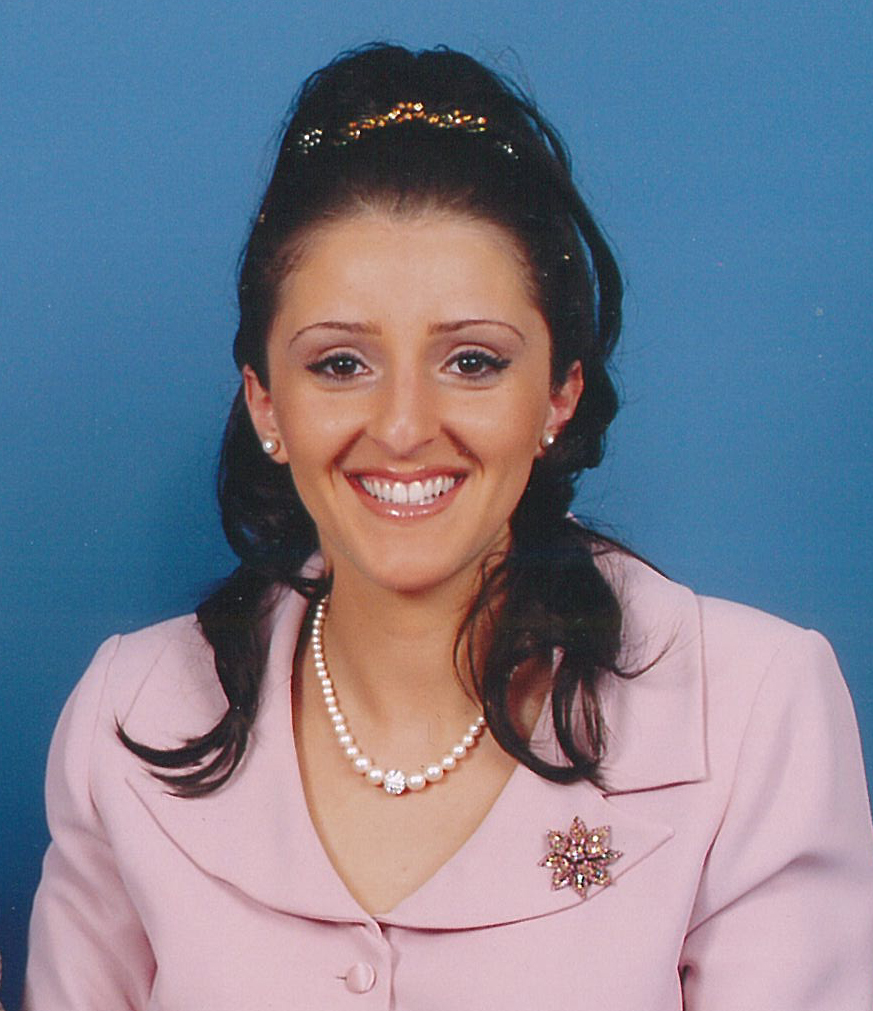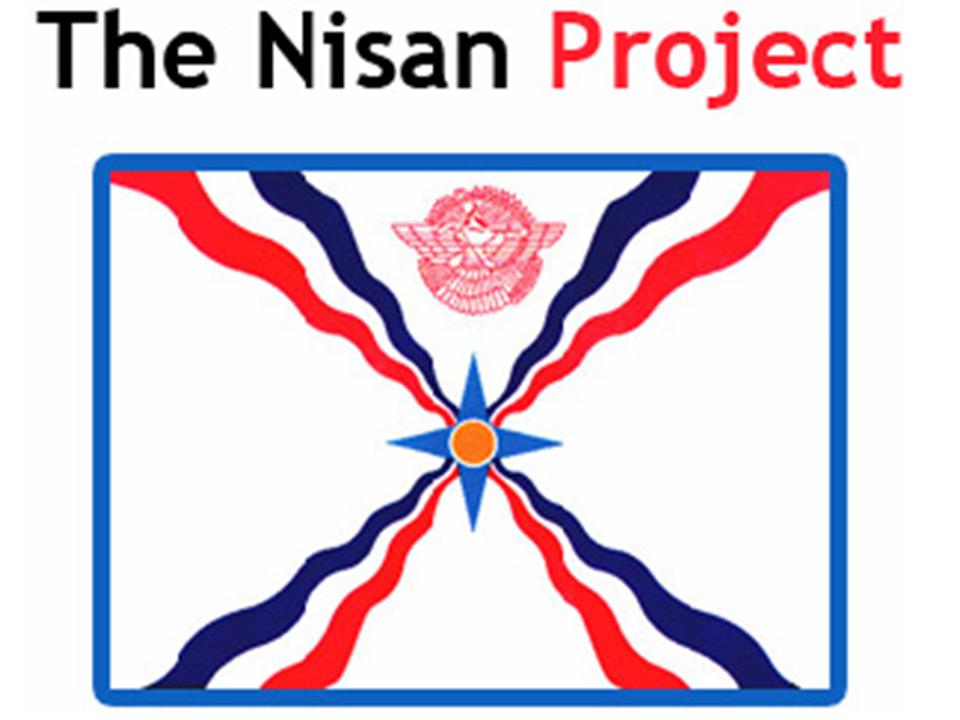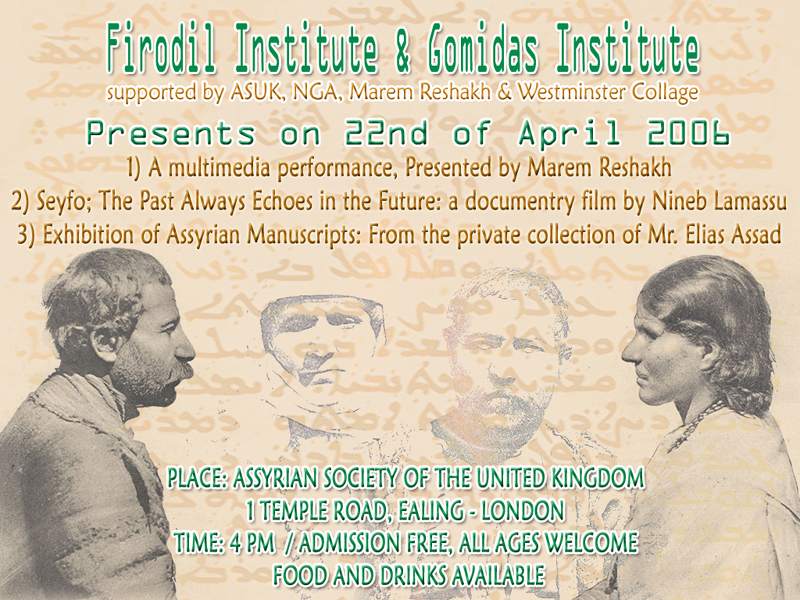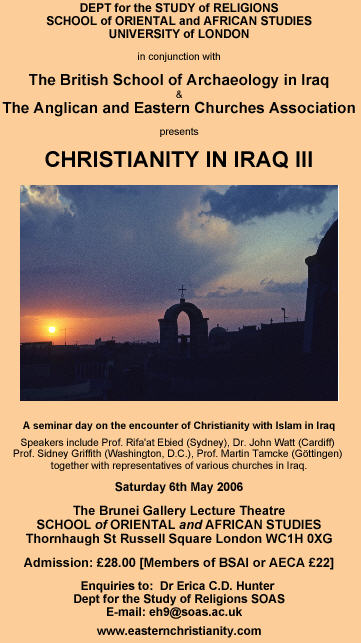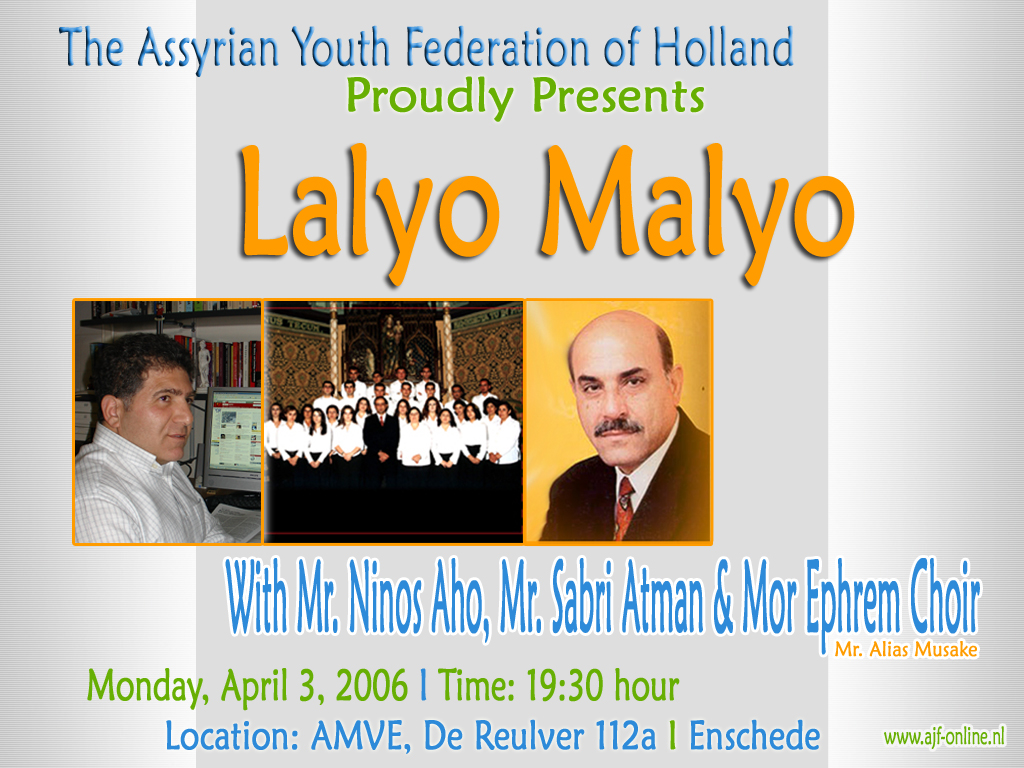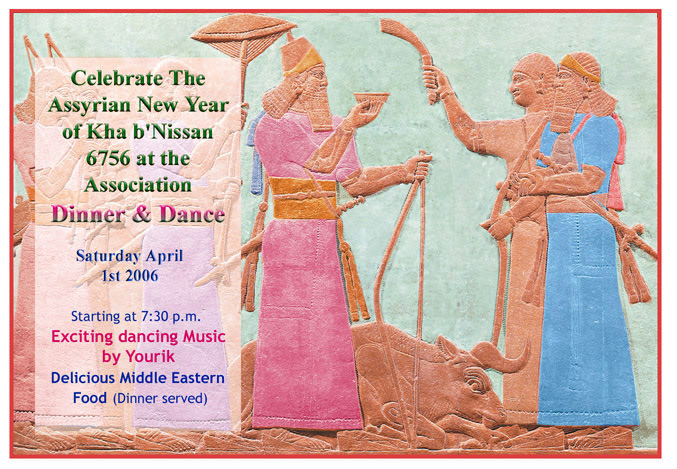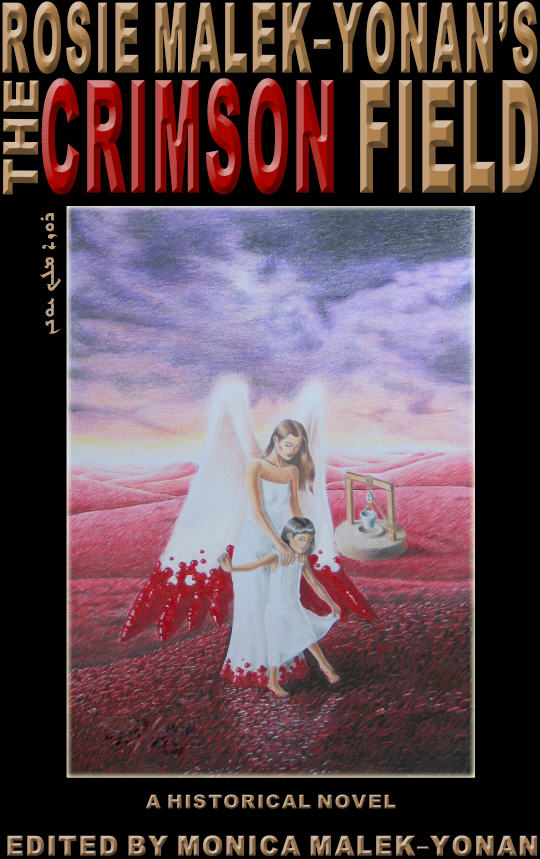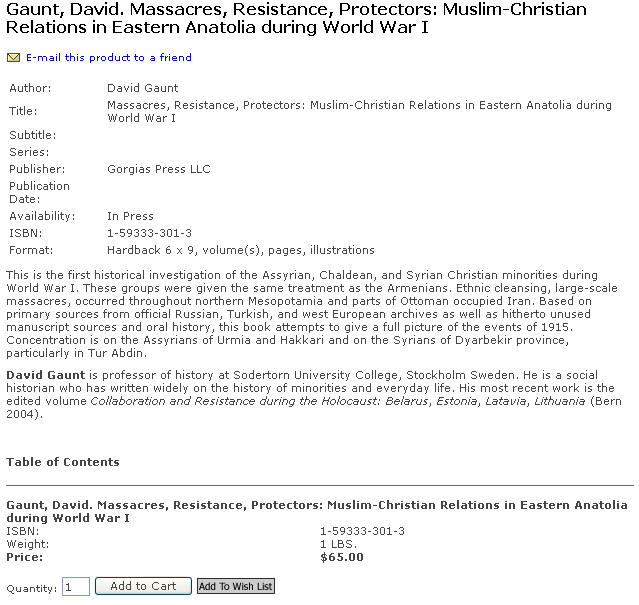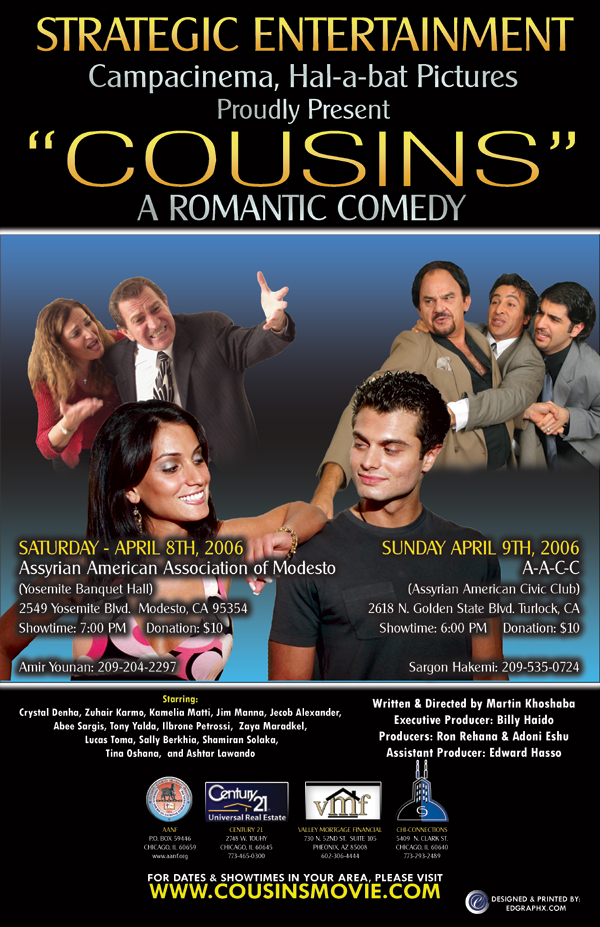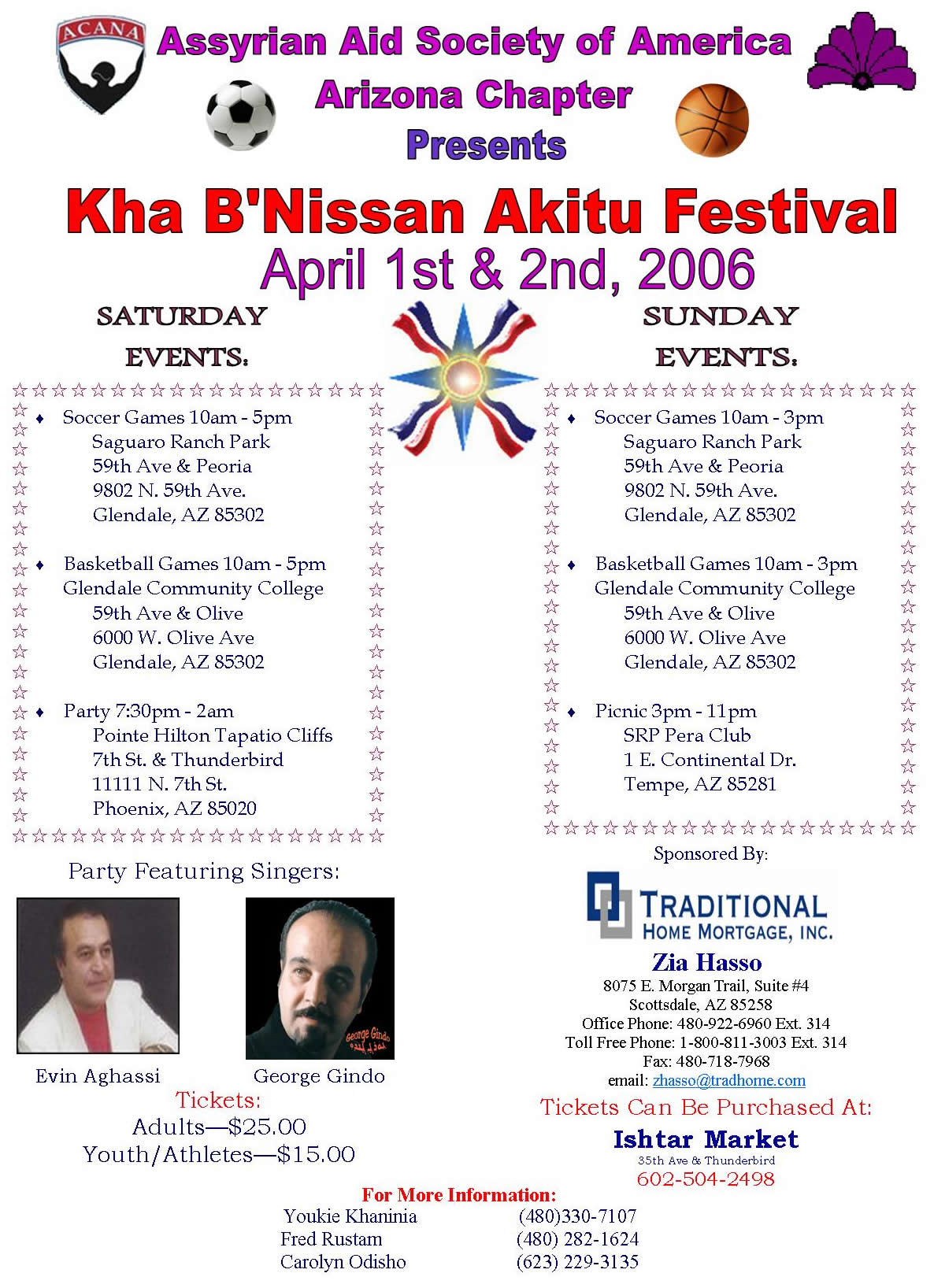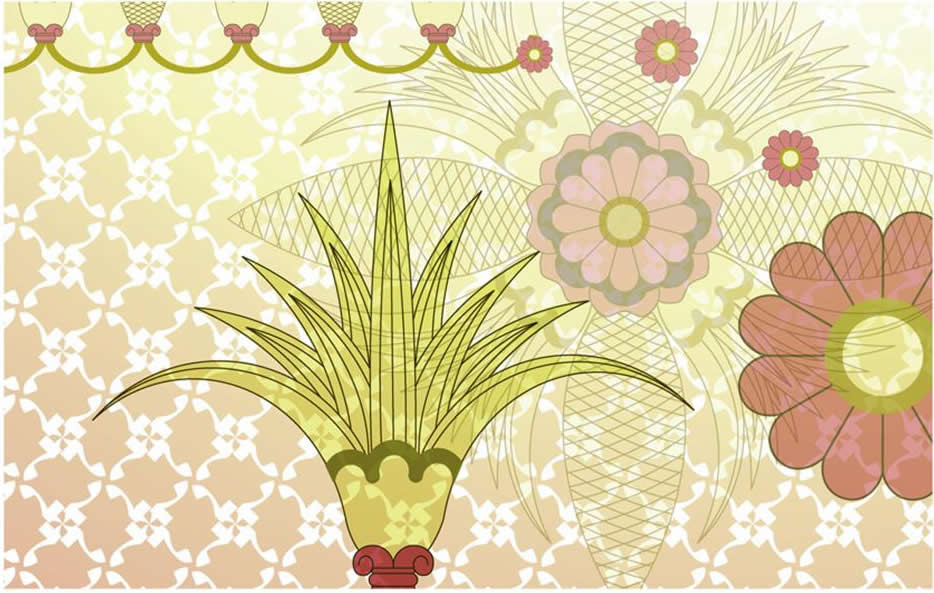|
Volume XII |
|
|
|
Tel 202-349-1429 | Fax 1-415-358-4778 | zcrew@zindamagazine.com
1700 Pennsylvania Avenue. NW Suite 400 Washington, DC 20006 U.S.A. |
|
|
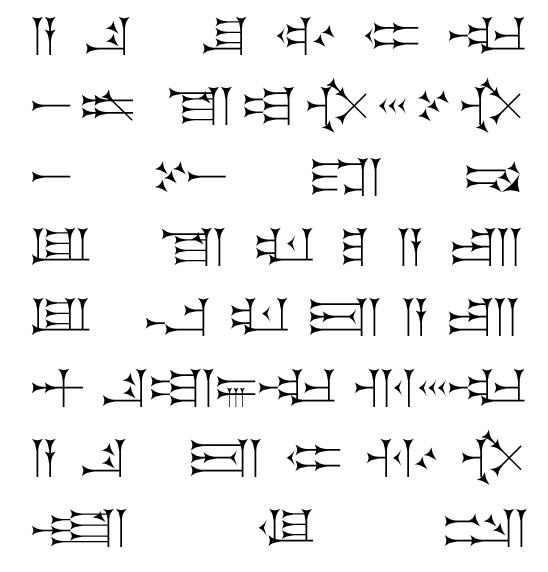
|
Ana šulmīka aššum šattim ššetim ašpuram. Lū šalmāta. Lū balṭāta. Ilum
nāṣirka rēška ana damiqtim likīl.
I write for your well-being on the occasion of the New Year.
May you be
happy.
May you remain in good health.
May the god who looks after you
provide you with good things. |
The new year greeting message in the ancient Assyrian cuneiform script is provided courtesy of Mr. Olivier Lauffenburger in France. With special thanks to Mr. Jean-Paul Sliva.
|
|
|
The Assyrian Calendar |
Wilfred Bet-Alkhas |
|
|
Khubba Khuyada Aturaya was Born in the Iraqi Desert |
Mikhael K. Pius |
|
|
2 Days of Fasting and Prayer Urged for Iraq |
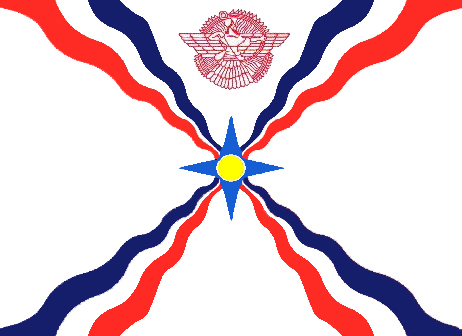 |
|
|
Assyrian New Year 6756
Brussels Prosecutes Assyrian Priest for 'Islamophobia'
USAID Director Meets Assyrian Leaders in Southern California
Viewer Funds Sought to Expand Ashur TV |
|
|
|
|
|
The Nisan Project
Christianity in Iraq III Seminar
Assyriska: A National Team Without A Nation
Phase I Selection of Assyrian Superstar A Success
Kha b'Neesan Party in France |
|
|
|
Conversations with the Assyrians of Mardin
Ignoring Christians and Minorities in Arab Muslim Countries
Freedom Betrayed! |
Mehmet Kalyoncu
Prof. Dr. Kamal Kolo
Rev. Ken Joseph Jr. |
|
|
Form Follows Function: A Design of An Assyrian Identity |
|
|
Zinda Says
An Editorial by Wilfred Bet-Alkhas
|
The Assyrian Calendar
The Assyrian Calendar begins with the first recorded year of the "beginning of civilization" (shooraya d'mdeetanayoota) as seen through the eyes of the ancient Bet-Nahranaye (Mesopotamians). These ancient inhabitants of Assyria, Babylon, and Sumer believed that civilization was a "gift from the gods" and it was marked from the time "kingship was lowered from heaven."
The earliest sign of municipal administration (kingship in pre-historic sense) appears during the Halaf Period in Mesopotamia (over 7000 years ago). The most notable characteristics of this period are the "sitting goddess figurines" indicating a goddess-worshipping culture and the distinctive colored potteries with geometric designs pointing to the existence of a high-culture civilization in Mesopotamia.
The Sumerian term akiti meant "building life on earth" symbolizing the handing of life from gods to man. The Babylonians adopted this term and called their New Year festival Akitu (modern-day Kha b'Neesan).
According to the latest archeological findings in Anatolia, the transformation of localized settlements to the first cities took place between 4300 to 3450 B.C.. Religion was the main focus of socialization during this period and each city possessed a religious complex (i.e. ziggurats). Each city was administered by a "local king" or lugal. Archeologists refer to this period as the Early to Middle Uruk Periods.
In the 1950's Assyrians believed that based on the research findings of their contemporary archaeologists the first construction of the city of Ashur's temple during the Uruk Period took place around 4750 B.C. This date was then recorded as the beginning of "civilization" in Mesopotamia. In fact, the impetus behind this decision was the publication of a series of articles in the Assyrian magazine Gilgamesh, edited by the famous poet-brothers, Addi and Jean Alkhas, and the late Nimrod Simono.
It is possible that the exact date of the beginning of civilization in Mesopotamia may vary as more accurate research reveals the existence of a more ancient and "civilized" culture in Bet-Nahrain. This fascinating topic remains as enigmatic as the exact date of the birth of Jesus Christ whose year of birth has been the fulcrum of historicity for the past two thousand years.
Incidentally, the Jewish Calendar has very questionable origins also. It begins with the year 3760 B.C. (as opposed to Assyrian 4750 B.C.). Indeed the year 3760 B.C. coincides with the time "kingship was lowered to mankind" in the city of Kish, southern Bet-Nahrain.
Until the Vatican can provide solid proof that Jesus of Nazareth was born precisely 2006 years ago on December 25 and the Israeli Knesset can furnish evidence of the Jewish Heritage in the year 3760 B.C., Zinda Magazine will continue to post the year 4750 B.C. as the beginning of "civilization" in Mesopotamia and the birth of the "Assyrian Conscience" in Assyria.
|
|
|
The Lighthouse
Feature Article
|
|
Khubba Khuyada Aturaya was Born in the Iraqi Desert
Mikhael K. Pius
California
The first organized Assyrian national movement was born in 1942 in Iraq. The Movement, Khubba Khuyada Aturaya, meaning Assyrian Love and Unity, was known as Khait-Khait or Khait-Khait-Allap (KKA). Its seed was planted among a group of Royal Air Force Assyrian employees in the barren desert of southern Iraq and a year later its sprout was transplanted in the more expansive and fertile environment of CC (Civil Cantonment) of RAF Station of Habbaniya where
a few thousand RAF Assyrian employees lived, with their families. The seed was a potent byproduct of an Assyrian nationalistic love felt by courageous Assyrian patriots. It was conceived, born and nurtured surreptitiously but lovingly and it grew for five years before a treacherous hand cut it at the roots and caused it to wither on the vine and die.
The seed is sown
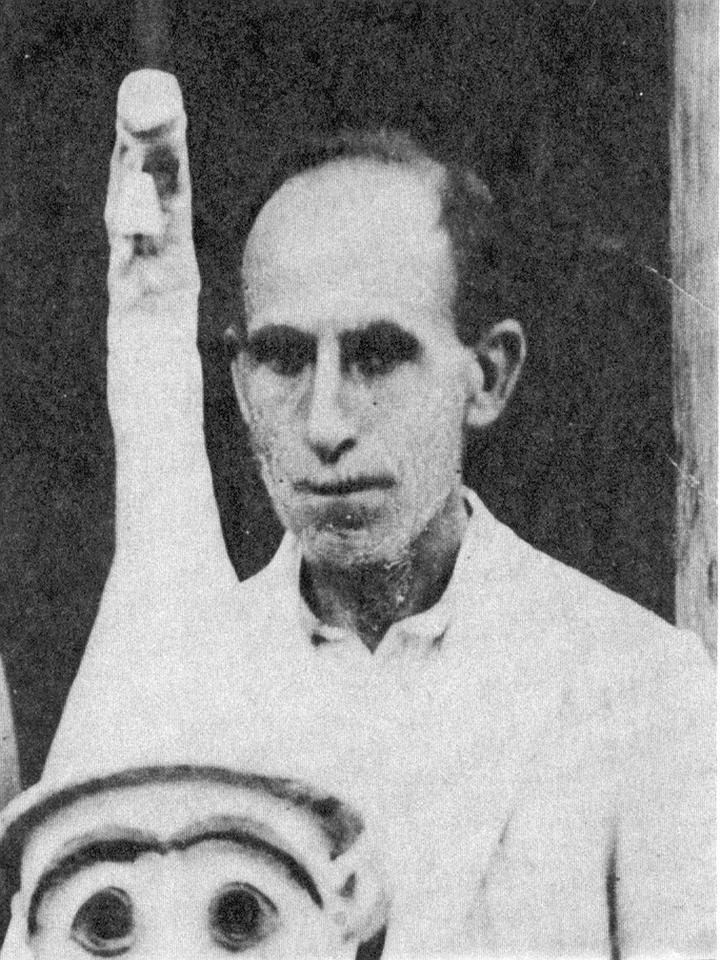 |
Ousta Moushi Khoshaba 1876-1951, posing (in an earlier age) with what looks to be an ancient statue. Photo courtesy Shimun Putrus. |
Khait-Khait Allap was originated by a carpenter named Moushi Khoshaba, popularly known as Ousta Moushi (master Moushi). He initiated the Movement among a working community of Assyrians living near the RAF Station of Shaibah. Numbering several hundred local civilian employees of various trades, the Assyrians were the bulk of the group that was transferred for a temporary project to the desert air base from the RAF Station of Habbaniya in central Iraq, 55 miles west of Baghdad.
These workmen toiled during the day in a place said to be called Site Hangars situated a few miles outside the RAF Station and they lived in a special camp of makeshift sarayif (huts) set up for them in the desert country within walking distance of their work place. But the permanent civilian employees of RAF Station of Shaibah lived more comfortably in a local camp of mud brick houses built inside the R.A.F. Station. The RAF personnel who worked with this temporary work force also lived in RAF Station of Shaibah, of course in proper accommodation and amenities of comfort.
The sarayif were made of hasseereh (mats made of reed and palm-tree leaves). Each makeshift sarifa consisted of two or three “rooms” and an open courtyard and each room accommodated two or more persons. They were provided for them by the RAF. Basic dry rations, cigarettes and military truck transportation for commuting as well as for periodic trips to the cities of Ashar and Basra 5 and 15 miles away, respectively, for shopping, church services and other needs were also provided free of charge.
The living conditions in this camp were pretty harsh; cold and leaking huts in winter and extreme heat, dust, and flies during summer, not to mention snakes and scorpions. The residents used kerosene lamps for night lighting and Primus stoves for cooking. They had common treated running water taps from which they drew water in empty petrol cans or buckets for their needs, but had no shower facilities. In summer they bathed out of a bucket in the open courtyard and in winter they heated water over Primus stoves and bathed once a week in aluminum tubs in their “rooms.”
And the outhouses were so unsanitary, it is said, that some people preferred to stroll out of the camp and do their ablution in the open desert.
During rest days and evenings these “bachelor” working men did their own laundry, cooking and other housekeeping chores, and for exercise and entertainment they played a few outdoor games among themselves in the desert, such as soccer, volleyball, and other field games.
One former camp resident, the late Shlimon Gewargis Daniel of Modesto, California, said “We played a local game like the American baseball, which we called Shaqqa Gouwana.” Another former resident, Davis Eshay David, also of Modesto, said “some evenings some of us youngsters would walk in a group the five miles to cinema in town [Ashar] talking and laughing aloud on the way to avoid being mistaken for prowlers and being shot at by the British Gurka sentries. And sometimes we would go on a picnic in a nearby palm tree grove. There we would find discarded old military articles, such as empty ammunition shells, old boots, and broken pieces of rifles—all probably relics from World War One days.”
Some would get together in a group in one of the large vacant sarifa dwellings (which they called club) to relax, drink tea, chat and play indoor games, such as chess, backgammon, drafts, dominoes or cards. A few had musical instruments they played, while others sang and danced khigga. Despite the miserable living conditions, they improvised to entertain themselves and their camp mates and while away their misery.
It was during such “club” group meetings that Ousta Moushi, a fervent nationalist, began to talk to them. First he narrated to them absorbing tales as well as stories from Assyrian history and about life in Armenia and Russia. Evidently, he had a knack for holding his listeners spellbound and would end the story on a high note, promising to finish it the next evening. “It was like watching a serial movie,” Davis said.
Then Ousta Moushi gradually began to speak of love, unity, nationalism and other subjects of patriotic interest. Evidently, his intention was to arouse and exploit Assyrian love and unity among them and to channel it into a nationalistic force.
At first, his listeners were just a few. But by and by their numbers grew into dozens. This early initiative took place in 1942.
Ousta Moushi’s intelligence, common sense, and eloquence were so absorbing that “even the gamblers gave up their poker games and listened to his nightly talks.” said Youkhanna Patros Youkhanna several years ago in Modesto. Youkhanna is an intelligent and observant person, now living in Sweden.
The first couple of years of World War II the war had not been going well for the British, and during a siege the Iraqi Army laid over the Royal air Force Station of Habbaniya in May 1941 Nazi German pilots, in collusion with a new imposed Iraqi Government, had bombarded Habbaniya, taking off from airfields in Syria and in Mosul in northern Iraq. In late 1941 until August 1942, when Field Marshal Montgomery took over command and was boosted by American Forces, Germany’s Field Marshal Erwin Romel, the “desert fox.” was giving the British hell in North Africa until he bogged down when he ran out of petrol and military equipment.
However, before this took place, following the Habbaniya Battle in May 1941, the British strongly feared the Germans might attempt to invade Iraq and Iran in order to control the two countries’ oil resources and simultaneously capture Habbaniya air base and hold all its British personnel captive. So a British and Indian military force, dubbed Paiforce (Persia and Iraq Force), soon swarmed all over the two countries to protect the British interests. Before the Paiforce arrived, however, three companies of Assyrian Levies, supported by a contingent of King’s Own Regiment and a few hundred RAF personnel with some old RAF airplanes, gallantly defended Habbaniya air base and defeated the 15 thousand Iraqi Army force along with hordes of Arab tribal warriors supporting the rebel government, thus temporarily averting the German threat (and consequently changing the course of war for the Allies). This was the first victory the British savored since the war began in September 1939.
The victory came about this way: In the first few days of the battle the RAF “softened up” with constant air bombardment the Iraqi troops entrenched on the Habbaniya Plateau overlooking the air base. Then the King’s Own Regiment contingent flown over to Habbaniya through Basra by the British at the time of the siege was given the first opportunity to dislodge the Iraqi Forces from the plateau. The KORs made an open ground daylight attack, but suffered heavy casualties from the Iraqi fire. The RAF withdrew the contingent and called on the Assyrian Levy companies to attack.
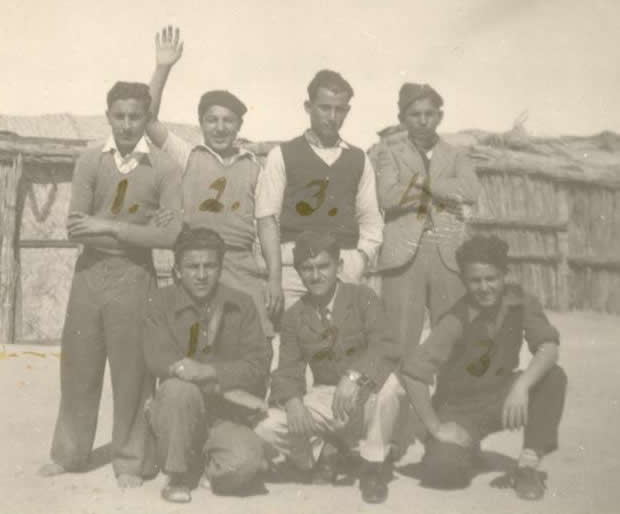 |
Seven of the young RAF Assyrian civilian employees who later became members of Khet-Khet-Allap posing in front
of their sarayif (huts) in the Iraqi desert near RAF Station of Shaibah, circa 1942. From left to right, standing are:
Andrious Mama, Davis Eshay David and the late Charles Aghasi Babilla and Ezaria Akhko; Squatting L-R are:
Souren, Shlimoon Youkhana and Khammo Enviya. Photo courtesy Shlimoon Youkhana.
|
The Assyrian Levies were raring to fight with tooth and nail because some of them had lost loved ones among the three thousand defenseless Assyrian men, women and children massacred by the regular Iraqi Army troops and police in Simmaile and other villages in Northern Iraq eight years earlier. Most of the Levies were not only well-trained soldiers but experienced mountain fighters. They made a three-pronged attack at night and soon routed the Iraqi Army and had it on the run toward the neighboring Sin Adh’dhiban village and finally 18 miles farther east to Falluja, which town the Assyrian Levies also subdued after a few days of furious fighting.
Despite this initial victory and the presence of Paiforce troops the British still feared the German threat. In 1942 the RAF therefore fortified their RAF Station of Shaibah as a British maintenance center and staging post, moving an essential part of their engineering machinery and air maintenance installations and equip-ment, such as the machine and aircraft engine shops and supply and maintenance units, from Habbaniya to Shaibah, which was close to Basra port, a shipping and escape gateway to India and elsewhere. Under British executive supervision, the Habbaniya’s local civilian clerks in the Shaibah desert carried out the adminis-trative paperwork, the skilled workers did various repair and maintenance work, primarily of motor vehicles and airplanes, while the unskilled labor did the menial work. The skilled group also turned out a variety of mechanical and aircraft small replacement spare parts, such as bolts and nuts, squares, springs, etc, which otherwise could not be obtained easily from England, thus contributing significantly to the British war effort.
Another aspect of the job of the assigned labor force was the transshipment through Iran to USSR of con-signments of military equipment and supplies received from America at Basrah port. USSR became the American and the British ally when Russia was invaded by Germany in June 1941 and Iran, under British influence, was the best and safest supply route to Russia. Britain was also trying to help its strapped war-time ally by furnishing it with some British war planes. The airplanes arrived in Shaibah from Cyprus and elsewhere and were being serviced and painted with Soviet Union emblem and markings and handed over to waiting Russian pilots, who flew them to Russia for engagement against the Germans.
However, it would seem that after the African campaign by Romel slowed down in the autumn of 1942 and the fortune of war gradually turned in favor of the Allies the feared German invasion of the Middle East completely evaporated in late 1943. The Shaibah project was therefore terminated and Habbaniya’s reinforcement units and supplementary work force at Shaibah were returned to their home base in Habbaniya.
The sprout grows into a tree.
After these RAF employees were returned to their families and former jobs in Habbaniya, where over two-thirds of the few-thousand local civilian work force was Assyrian, the KKA Movement was planned and organized well and took hold and spread among the Assyrian male community of CC. General opinion is that several hundred of the Assyrian civilian employees, especially those loyal and patriotic ones, including some Levy civilian clerks, were recruited into the Movement during its five-year run. The Assyrian Levy personnel, however, had to turn a blind eye to the Movement and stay away from it in view of their firmer commitment to the RAF.
Originated and headed by Ousta Moushi, KKA operated underground, because Assyrian nationalist activities were forbidden by both the RAF and the Iraqi government. As a result of this and the fact that the RAF had obliged every person they employed to sign a document promising to safeguard the confidentiality of his or her work and to be loyal to the British employers, KKA held its members to an oath of secrecy and loyalty of its own, with the pledge to accept and carry out orders and defend the Movement and its objectives.
One person remembers that when he became a member, he was taken by his sponsor to Ousta Moushi’s house. Ousta Moushi had brought out a Bible and a sword and asked him to kneel down and put his right hand upon the Bible. Placing the sword upon his shoulder, Ousta Moushi had recited the oath of allegiance while the new member had repeated after him, swearing to secrecy and to be loyal to the Movement and to abide by its commands. He was then given a secret password name and the necessary instructions.
Another former member says that every two candidates would go together to take the oath and be given secret password names, and that a fork and a knife would be placed on the table during the oath-taking ceremony. Yet another one alleges that a dagger was placed on the table during the ceremony. But none can remember the wording of the oath nor is able to explain the symbolic meaning of the articles.
According to Shlimoon Youkhanna of Chicago, membership acceptance was sponsored by existing members and was based on the candidate’s loyalty, good character and ability to perform. “I personally was sponsored by three members of the ‘High Command’ but whose names I don’t want to mention; they’re all deceased. I took the pledge of allegiance in a dark room in a B type home of one of my sponsors. After the “Pledge,” my sponsor cut his right wrist and my right wrist and put our bleeding wrists together, signifying unity.
Ousta Moushi had thought up the idea of establishing the movement to benefit his Assyrian people. Evidently, after secretly discussing it with some nationalistic elders of the community in Habbaniya and obtaining their cooperation, he planned and tailored KKA supposedly in the fashion of the Tashnak, the Armenian nationalist party, whose member he had been in Armenia for 15 years.
KKA was composed of dozens of small groups, or cells. Each cell had a secret code number and each member was given a secret code or password name. For instance, one prominent member says his name
was “Danube” and Ousta Moushi’s code name was “Judex.”
Cells were made up of six or more members, with a leader. Members of each cell knew only each other.
L i n d a B a d a l o f |
 |
I'm just a phone call away!
24200 Magic Mountain Pkwy.,105, Valencia, California 91355
Direct Phone: (661) 287-3200 x3468 Cellular: (661) 645-4290
Email: LindaBadalof@SCVFineHomes.com
|
No group members’ names were made known to members of other groups. They were kept secret. Communication was made through a chain of committee leaders. Every dozen cell leaders formed a committee which communicated through its leader with the leader of another committee, which in turn was connected through one committee leader with the next committee, and so on, till the chain reach the Central Committee, the governing body. Thus the identity of only a few members was known to a few other members, while the bulk of the membership operated incognito.
The Central Committee, which issued the orders, was formed from the founding and elderly members. But their names were known then only to a select few. Some of the leaders’ names mentioned today were: Ousta Moushi Khoshaba, his brother Samson, and Gewargis Daniel (all of Solduz); David Iskhaq (of Gavilan); Polous Oda (of Toulloun) and his nephew Levi Jebrail; Ewan Warda and William Shabbas (of Chamakiyeh); Raabi Aprim Binyamin (of Spurghan); Binyamin Gundalove (of Mar Bishu); Shawel Sulaiman, Rovil Mikhail, Sargis Michael, and Avimalk Yonan Orahim (of Gangachin), David Koryakos (of Jilu). All the elder members have been dead for some time. Of course there may have been other names in the Central Committee, but all the former members interviewed during recent years were then very young and didn’t know or can’t remember everything.
Meetings of individual cells and of various committee and Central Committee leaders were arranged secretly and held covertly in different places, usually in members’ homes, but sometimes in isolated locations.
The Movement’s echo penetrated Assyrian communities in Baghdad, Kirkuk and Basra as well as in Syria and Iran. It is said that it was received ardently particularly by the Assyrian community of Abadan and Teheran and by the Assyrian employees of the Iraq Petroleum Company’s pipeline stations. Messages were sent to Syria and Iran by hand of trusted members dispatched specifically for organizing purposes. One former member alleges that the Movement’s voice reached even some Assyrian groups living in the United States through messages dispatched by hand of Assyrian-American pilots visiting Habbaniya. But this has not been corroborated except by one who says he knew American pilots would come to Habbaniya, but doesn’t know if there were any Assyrians among them who took Khait-Khait-Allap messages to America. Still another former young member, Shlimooon Youkhana, alleges now that he was assigned to deliver a secret message to the late Patriarch Mar Eshai Shumon living in exile in Cyprus. He managed to have himself transferred, as a Levy clerk, to Cyprus, but that a Levy Assyrian high-ranking officer unknowingly thwarted his KKA assignment. While he was waiting in Haifa in transit for Cyprus, the Levy officer knew of his competence as a clerk and ordered him to stay in Haifa and work for him.
The tree wilts and dries up.
Khait-Khait-Allap made a steady progress for five years. Then it came to an abrupt halt when the RAF authorities uncovered it in 1947. It is not quite clear as to why and how the RAF learned about it. Today some think it was the result of a struggle within the leadership (as our national situation is today) and one prominent former member alleges that Ousta Moushi was led astray by flatterers and kinsmen. Others deny this and assert that Ousta Moushi was loved and respected as a leader and had no opponents, because he did not really hold himself above the others, for decisions were made by the Central Committee members. Some others feel it was the hand of a treacherous Assyrian or Assyrians who thrust the spoke into the wheel, in order to gain favor from British employers.
One leading former member, the late Sargis Michael of Chicago, said it was a disgruntled demoted officer of the Movement who, to avenge himself, informed the Officer in-charge of the Cantonment. But Sargis did not divulge the culprit’s name. Still others think guileless and gullible members exposed the existence of the Movement by talking about it to trusted friendly British personnel, who in turn passed the information on to RAF Intelligence sources. Mr. Michael also said that he had seen a top secret RAF report on the Movement, smuggled out of a British high-ranking officer’s office by Assyrian civilian clerks.
Whatever the reason, two former members allege that Ousta Moushi and a few of his lieutenants were summoned to CC Office and were arrested, though three other interviewed former members had no knowledge of anyone being detained following the interrogation. Another source alleges that Squadron Leader Lovett-Campbell, the Officer-in-charge of CC at the time, had summoned Ousta Moushi and a few others to his office. He had placed his gun on the table and had told them words to this effect: “If it’s true that you people have a communistic movement I will shoot you all with this gun!” But this statement has not been corroborated.
Mr. Michael also alleged that Mr. Lovett-Campbell was even contemplating on evicting from the Cantonment some 150 of the known Movement members. He also said that two pro-Assyrian British officers, however, took the case out of Mr. Lovett-Campbell’s hands and secretly passed the word to the KKA leaders to disband the Movement quietly before things got worse and the Iraqi Government learned of it. One of the officers was Major E.C. Day of Levies, with whom Sargis Michael alleged to have had a secret meeting one evening regarding the matter. Major Day was one of the few British officers who were known to be friendly with Assyrians.
Evidently, the RAF authorities were afraid the Movement was communistic. But after the investigation they realized that Ousta Moushi was an intelligent and able leader but had no ill intentions towards the RAF or the Iraqi authorities and that the Movement’s aim was merely patriotic, to create love, unity, and comradeship among the Assyrian community and that in fact it had no teeth to bite.
KKA and local labor strike
Some people believe that the Iraq Petroleum Company’s Kirkuk labor strike of 1948 and the Habbaniya labor strike of 1952 were both connected with, or influenced by, KKA Movement in some way. Another former member alleges that the Movement or at least its spirit did not die until Habbaniya’s abortive labor strike that took place near CC gate on June 9, 1952, when, the evening before the strike, eleven Assyrians, accused of being “ringleaders,” were detained and a few others were wounded by RAF gunfire during the strike. He believes the strike was arranged by the dormant KKA Movement or inspired by its spirit.
In regard to the Kirkuk strike, the general consensus is a firm “No!” It is known that the Kirkuk strike, during which some Iraqi workers were wounded, some shot dead, some jailed and a few hanged by the Government, was organized and directed by the Iraqi communists.
But there are mixed opinions concerning the Habbaniya strike. A few attribute its occurrence to former members of the then dormant KKA Movement, or at least to its spirit. Others think it was a conspiracy against Assyrians, instigated by Habbaniya’s local Kurdish communists and other non-Assyrian elements that managed to put the blame on the Assyrian community and made scapegoats out of seven of its hapless members, who were imprisoned in August 1952 for 10 months without trial. Still others believe that the strike was not prearranged but that it happened spontaneously after British armed servicemen blocked the CC Gate through which workers were going out to work on the morning following the short detention of eleven Assyrians the night before the strike.
But if KKA, or its spirit, was still alive beyond Squadron Leader Lovett-Campbell’s murderous or eviction threats, the 1952 failed labor strike definitely killed it!
After the RAF investigation of the Movement was over, Ousta Moushi was not jailed or evicted from the air base. Thinking he might become an unwanted problem for them later on, however, they dismissed him from his RAF job as a carpenter but left him to live with his family in one of the lowly type of houses in C.C. His teenaged eldest son Aram was earning only a meager income and so the Movement’s founder and leader fell on hard economic times.
At that time, the Movement had a cash balance of ID300 (about $1000) in its secret fund. The money was deposited, one leading member says, with one of Ousta Moushi’s related associates. A wish was expressed to donate the money to the fallen leader to help him in his economic hardship. But in order to avoid the possibility of a controversial furor over the decision, a few of the leading members thought it best to give the money instead to Mar Gewargis Church of the East in Habbaniya, which they did. So Ousta Moushi lived a quiet and austere life with his family until his death in 1951 at the age of 75.
Who was this patriotic “planter”?
What sort of person was this man who apparently possessed this gentle and humble yet effective leadership and commanded the love and respect of his fellow patriots?
In a composite picture, Ousta Moushi emerges as being a rather short man of average weight at the threshold of old age, somewhat hard of hearing, with a solemn face and a balding head of gray hair. He wore glasses, and often walked with a slightly stooped posture. He sometimes wore a beat-up English cap or a cylinder felt hat and a jacket that was a little too long for him, over baggy trousers. He buttoned up his shirt collar but did not use a neck-tie. “He did not care much about his dress,” Youkhanna Patros Youkhanna said.
His attraction and charismatic personality was apparently not in his looks or attire but in his resourcefulness and in his voice, style, and the content of his speech. Evidently a very intelligent person, with a good knowledge of world affairs, he has been described as being modest and gentle; a good listener who made eye contact and spoke slowly and in simple terms to make his meaning easily understood, giving his listeners the conviction that they were in the presence of a knowledgeable man; an unassuming, earnest, sincere and understanding person. It is said that he had an amazing memory and that he could recite, word for word, passages from what he had read previously. And when he talked he was so eloquent and persuasive that he would quickly captivate his audience’s attention. Shlimoon Youkhana dubbed him “The Churchill of the Assyrian Nation.”
Ousta Moushi had two younger brothers, Samson and Yosip. All three were employed as carpenters in the RAF Station of Habbaniya. Ousta Moushi and his wife Rakhy, daughter of Yosip Badal, had three children: Aram, Youliya and Awner. Awner died at the threshold of middle age in mid-nineties in Chicago, Youliya now lives with her family in Glendale, California, and Aram is a preacher in England.
According to information supplied by his son Awner, shortly before his death, Ousta Moushi was born in Solduz, Persia (in the Urmia region), in 1876. He was the eldest son of Khoshaba Moushi and Saanam. Saanam was Armenian, and Khoshaba was an ordained deacon of The Ancient Apostolic Catholic Church of the East in Solduz. He was, however, later converted to Presbyterianism and became a preacher in his village. In 1885 he moved his family to Armenia, where his nine-year-old eldest son, Moushi, grew up and lived for 26 years. During this time, Moushi went to school, was a member of Tashnak Party, and served as an officer in the Armenian Army, before returning to his native village of Solduz in 1911. During the Great War he is said to have served as an officer under Agha Patros Eliya, the Assyrian general commanding the Assyrian Forces fighting alongside the Russians and the British against Turks and Kurds. He and his family arrived in Iraq in late 1918 among the some 50 thousand surviving Assyrian and Armenian refugees following the mass Christian retreat from Urmia, Persia.
It is said Ousta Moushi was a cultured man, who had a good knowledge of world affairs, especially about Russia and Armenia. It appears that he was also a linguist: he could read and write several languages, among them Armenian, Assyrian, and Russian and, some say, English and Farsi, and could speak Turkish and Kurdish and a spattering of Arabic. Youkhanna Patros Youkhanna thinks that a man of such stature may have traveled to Russia, visiting its great cities and historical sites, and perhaps even read some of the world classics.
What was KKA’s aim?
The KKA Movement’s method of operation seems somewhat reminiscent of communist system. Was it a communistic sort of Assyrian nationalism? While one former member says he heard later that Ousta Moushi was communist-oriented and had the system’s objectives, several others deny this and assert that he was a nationalist. He had been a long-time member of Tashnak, and had taken part in military campaigns against the Ottoman Turks. And Tashnak was known to be strongly anti-communist. “His main intention,” said Shimun Putrus “was to bring love and unity, develop and enhance Assyrian nationalistic spirit towards helping one another in every way possible, with a long-term aim of securing a national home and identity for our people in our legitimate fatherland.”
Shimun Putrus also asserts that Ousta Moushi was against violence. The gentleman explains that a few young hot-headed members suggested to Ousta Moushi that they do away with a well-placed Assyrian opponent of the movement who wanted to stir up trouble. Ousta Moushi was outraged! “We do not kill!” he told them. “We have come to unite. We don’t want any blood to come from the nose of anyone. But
when our cause is ripe, we shall do whatever is necessary against those who stand against us.”
Apparently, the Movement had a political aim in the long run. But first Ousta Moushi wanted our people to unite, love each other, and live in harmony, simultaneously spreading the message to the Assyrian communities elsewhere.
Ousta Moushi was evidently a brave man too. Shimun Patros said that when Mufawwat (Commandant) Patros of the CC Iraqi Police Station told him he was accused of being a communist, Ousta Moushi cursed his accuser and said to the Mufawwat: “Perhaps you are communist, but I am not! Your government should kiss our feet, because we are the ones against communists. We want to unite our people and stop the communists from infiltrating us.”
Another former member says that Ousta Moushi’s purpose in establishing KKA was to fight off Assyrian tribal, clannish, and religious differences and unite his people in love under one command. Apparently there was evidence of this purpose.
Assyrian community of Habbaniya was a conglomeration of dozens of tribes and clans professing several Christian denominations, namely Church of the East, Chaldean Catholic, and Greek and Armenian Orthodox Churches, with a sprinkling of various Protestant believers.
There was some prejudice between former territorial groupings of Urmizhnayeh (city-bred Bne-Urmia), Shapitnayeh (farming plainsmen) and Tourayeh (mountain tribesmen) on one hand; and between the many tribes and clans among these groupings on the other hand, as well as between the various Church denominations. This sometimes espoused bigotry, resentment, ill-feeling and even physical conflict. So Ousta Moushi’s work was apparently aimed at bringing together the conflicting factions in a bond of love and brotherhood.
What did KKA achieve during its lifespan?
Evidently, Ousta Moushi’s aim was an experiment in creating for the Assyrians a movement and a
commonly accepted leadership that could unite them as a people on equal terms in love and unity, which aims, Ousta Moushi is alleged to have said following his alleged detention and interrogation, “had been achieved.”
One member recalls that after Khait-Khait-Allap was established in Habbaniya, conditions truly became much better to the point that Assyrian people became closer to each other. Consequently, the emerging sense of brotherhood reduced tribal or religious differences. There were fewer disputes and people were more friendly and affable. It is said that where there was trouble, Movement members would quietly get involved to help solve the problem or improve relations whether between families or friends, between husband and wife or between parents and children, untying knots, soothing hard feelings and making peace. Efforts were also made to counsel the few wayward girls of the camp back to the right track.
It is also said, though disputed by one member, that anyone who had lost his job or was sick or in need, the Movement would quietly offer a little aid from the small fund fed by a monthly membership subscription of 100 fils [25¢]. This fund, however, was not connected in any way with Habbaniya’s Assyrian Relief Fund, which was officially recognized by the Iraqi government. The KKA fund was kept secret for fear that if it was known to RAF authorities, it would prove politically incriminating for the Movement and that the British might disclose it to the Iraqi Government.
Today’s prospects for unity and national rights
These Assyrian patriots of the past risked their livelihood and that of their families as well as staked their personal political safety in order to work for the welfare and unity of their people. Of course we have today some of our leaders and their followers in our former homeland, Zowaa members in particular, who have also put their lives on the line and are doing what they can, swimming against the tide so to speak, to accomplish something for our people. With financial assistance from the Diaspora Assyrians, they have not only done a lot of good work for our strapped people in Iraq in general during this past decade or so, but have also sacrificed the lives of dozens of their cadres for the cause.
And what have “our” puppet leaders abroad done toward advancing our political cause, educating our children and helping the sick and the needy in the Homeland, or towards the resettlement of the tens of thousands of our stranded masses languishing in miserable conditions in semi-hostile countries?
They have done nothing other than creating impediments, criticizing, ridiculing, opposing and trying to stir up trouble for those who are really working, thus causing division and confusion among our people.
We all know that in order to stand a chance of securing our national rights as a people in a land torn asunder by political, ethnic and religious animosity and strife, all of our people, in all their three factions and various religious denominations, should first achieve national unity and a common purpose, speaking in one voice. Instead some of our so-called leaders in the West (both political and religious), who enjoy comfortable, secure, and even affluent lifestyles as well as freedom of speech and press, do no more than blow hot air and oppose the doers.
Our Assyrian people as a whole still aspire to love and unity under one united leadership. But this still seems like an elusive dream, because evidently our love is faithless and our unity is splintered in many different political, religious and personal directions!
Our people in Iraq in general are now at critical crossroads. What we need most is unity. In unity there is strength of voice and strength of purpose. Unfortunately, instead of pulling all together, there is a three-way tug of war between them that threatens to pull them all asunder. And to make things worse, even the unity among the Assyrian Church faction is now splintered by those who do not want unity. Under the circumstances, what chance do we stand of achieving our ethnic, religious and political rights in our homeland under the central government, let alone in a self-administered territory of our own?
Perhaps what we really need is to produce a wise, meek and selfless leader of peace and goodwill; someone like the late Ousta Moushi. Or better still, a group of wise men to bring all the factions together and to unite and lead us under one banner!
Is another Habbaniyan, namely Raabi Younadam Yosip Kanna, such a man? And is Zowaa the group of wise men who are destined to lead us under one banner to achieve our national rights?
Or are we in fact promoting and nursing a pipe dream?
Author’s Note:
I acknowledge the assistance of the following persons who supplied feed-back or corroborated some of the information for this article: Shimun Yosip Putrus, Youkhanna Patros Youkhanna, Binyamin Warda, Francis Shawel David, Davis Eshay David, Shlimoon Youkhana and the late Fraidon Orahim Is’hak and Sargis Michael as well as several others from California, Chicago and Australia who prefer to remain anonymous. (The writer was not in Habbaniya during the KKA years. He left Habbaniya for Baghdad in January 1942 and returned only shortly before the Movement broke up. And until the fall of Saddam in April 2003 Assyrians were afraid to discuss Khait-Khait-Allap in Iraq.)
 Mr. Mikhael K. Pius is the Editor of HUSCA Magazine (Habbaniya Union School & Community Association). Click here to view copies of this publication. Mr. Mikhael K. Pius is the Editor of HUSCA Magazine (Habbaniya Union School & Community Association). Click here to view copies of this publication.
|
|
Good Morning Assyria
News From the Homeland
|
2 Days of Fasting and Prayer Urged for Iraq
Courtesy of the Zenit News Agency
27 March 2006
(ZNDA: Rome) Chaldean Patriarch Emmanuel III Delly of Baghdad has proposed April 3-4 as days of fasting and prayer for peace in Iraq.
Auxiliary Bishop Shlemon Warduni read the patriarch's appeal on Sunday, during a visit to the Italian city of Gallipoli.
"We have estranged ourselves from God by our deeds," wrote the patriarch in the message, which was reported by Italian bishops' SIR news service; "we do not obey his will, and we have moved away from piety and virtue, from forgiveness, and because of this the blood of so many brothers has been shed and so many children have remained orphans."
For this reason, the Christian representative said, "we must return, repentant to God's house to do the will of our sovereign God."
"To achieve this sublime objective," the message said, "we invite all Iraqis, in and outside of Iraq, and all believers and people of good will, to prayer and fasting this coming Monday the 3rd and Tuesday the 4th of April, so that the Lord will restore peace, tranquility and security to Iraq, country of our beloved Abraham."
|
|
News Digest
News From Around the World
|
|
Assyrian New Year 6756
Greetings from the Assyrian Universal Alliance
For Immediate Release
Assyrian Universal Alliance
Post Office Box 19273
Kalamazoo, Michigan 49019
Tel.: 269-823-4768
Fax: 269-372-4561
March 28, 2006
It has been our tradition since the days of our forefathers in our ancestral homeland Assyria to celebrate the New Year on the first day of the Assyrian month of Nissan (April). Known as “Kha B’Nissan” and regarded as one of the most important religious and national observances held in Assyria, it is a celebration which represents the revival and renewal of nature.
 |
| The Procession of the Akitu Festival (12 days celebration of Kha b'Neesan in ancient Assyria) took place along this street in ancient Babylon. For more information click here. |
The Assyrian Universal Alliance (AUA) extends its warmest greetings and congratulations to Assyrians all over the world on the occasion of Kha B’Nissan, the Assyrian New Year 6756. We hope that on this first day of Nissan, Assyrians worldwide will jointly strive toward instituting our national aims and aspirations for a rising and prosperous Assyria, which is free of aggression and inhumane acts of beheading, kidnapping, assassination and bombing of holy places.
The month of Nissan holds a special place in our hearts because it was in Nissan (April) 1968, that the AUA was established in Pau, France, to become a powerful voice for the Assyrians, committing itself to the spreading and upholding the Assyrian name internationally, and working to secure the sacred human and national rights of the Assyrian people in our homeland. For nearly half a century since its inception, the AUA has ventured in both civic and political arenas pursuing our people’s desire to regain their rights to live in dignity and peace with other nations of the world, especially in our
ancestral lands along with other Iraqi people.
The AUA continues its effort to unify the Assyrian organizations and political parties for this legitimate struggle. In line with this policy, the AUA will host a meeting in The Netherlands on April 1 and 2 to further enhance and solidify this unity. Furthermore, the AUA will work determinedly with our beloved Iraqi people seeking to establish a unified, democratic, secular, pluralistic and parliamentarian government in Iraq that will guarantee human rights and equal status for all citizens regardless of their ethnic background or religion; an Iraq that is based on the rule of law; an Iraq that enjoys full sovereignty and territorial integrity; an Iraq that recognizes and accepts the Assyrian Nation
constitutionally as a principal nation within the political frame of its Republic, so that we can live in amicable harmony with all people of Iraq.
We wish you a prosperous Assyrian New Year.
Brussels Prosecutes Assyrian Priest for 'Islamophobia'
Courtesy of the Brussels Journal
30 March 2006
By Paul Belien
Special thanks to the Assyrian International News Agency
(ZNDA: Brussels) One of the rare Belgian churches that is packed every weekend is the church of Saint Anthony of Padova in Montignies-sur-Sambre, one of the poorest suburbs of Charleroi, a derelict rust belt area to the south of Brussels. Holy Mass in Montignies is conducted in Latin and lasts up to four hours. Yesterday over 2,000 people attended the service by Father Samuel (Père Samuel). The priest's sermon dealt with his persecution. The Belgian authorities are bringing the popular priest to court on charges of racism.
DAVID YOUKHANA
|
|
ARIZONA
Real Estate-Relocation-Investment |
|
Broker / Owner
Certified Commercial Sales Specialist
Babylon Realty
Glendale, Arizona 85310
Click Photo For More Information |
602-410-9555
|
|
Father Samuel has been prosecuted for "incitement to racist hatred" by the Belgian government's inquisition agency, the so-called Centre for Equal Opportunities and Opposition to Racism (CEOOR), because of a remark he made in a 2002 television interview when he said:
"Every thoroughly islamized Muslim child that is born in Europe is a time bomb for Western children in the future. The latter will be persecuted when they have become a minority."
Last Thursday the Belgian judiciary decided that the priest will have to stand trial before the penal court in Charleroi. He reacted by repeating his time bomb statement and added that he would be honoured if he had to go to jail for speaking his mind. He added that Jesus, too, had been convicted. During yesterday's sermon he called upon the faithful to accompany him to court. "We will turn this into an excursion, driving there in full buses."
Father Samuel's passport gives his name as Charles-Clément Boniface. That is not entirely correct. He was born in 1942 in Midyat, Turkey, as Samuel Ozdemir. The latter is a surname the priest dislikes because, he explains, it was imposed on his family by the Turks. Samuel was a Christian: "At home we spoke Aramaic, the language of Jesus." The Aramaics are a Catholic minority in Syria and Turkey. They speak an old Semitic language, which Jesus and the apostles used and which Mel Gibson had his actors use in his movie The Passion of the Christ.
Young Samuel became a Catholic priest. In the mid-1970s he fled to Belgium, claiming that the Aramaic Christians were being persecuted in Turkey. He became a Belgian and adopted the surname of Boniface -- "he who does good things." He was appointed to the diocese of Tournai, but soon became caught up in the culture war between Christians and secularists. Tournai is a thoroughly secularised, modernist diocese. Father Samuel clashed with the bishop, who suspended him in 2001. He then bought the St-Antoine-de-Padoue church in Montignies-sur-Sambre. There he conducts the Mass according to the traditional rites of the Catholic Church.
Hundreds of faithful from all over the country and even from the north of France attend Sunday Mass in Montignies-sur-Sambre. The congregation includes African immigrants, a large number of young people and many young families with small children. In his sermons and on his website Father Samuel speaks out against secularism, but also fights on another front of the three-way culture war, warning against "the islamic invasion" of the West. He says he has witnessed in Turkey what the future has in store for Europe. He claims Muslims are invading Europe and warns for an impending civil war. According to Father Samuel "so-called moderate Muslims do not exist."
USAID Director Meets Assyrian Leaders in Southern California
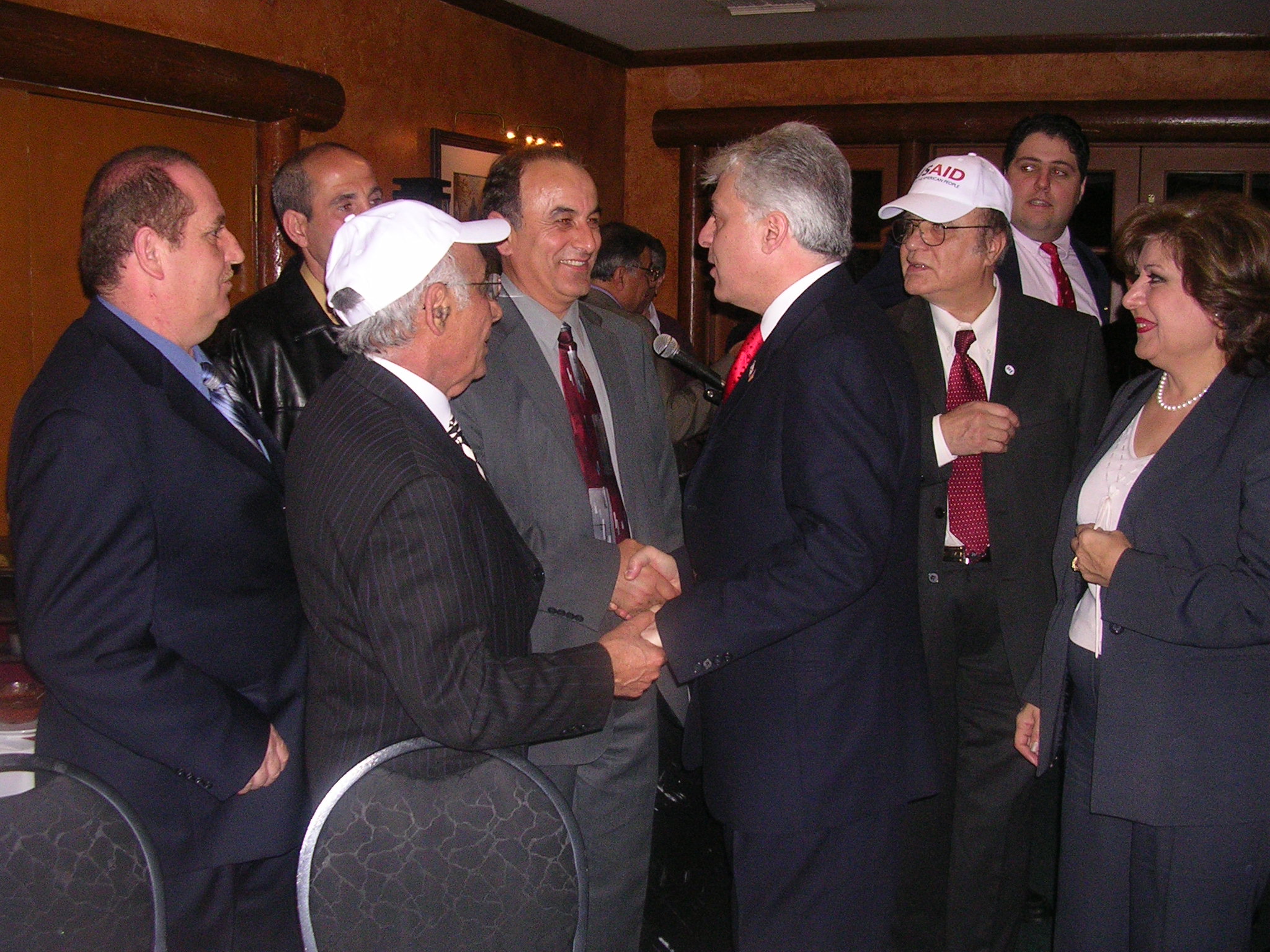 |
Mr. Walid Maalouf (center), Director of the Office of Public Diplomacy for Middle Eastern and MEPI Affairs at USAID meets Assyrian community leaders in Los Angeles, California. |
(ZNDA: Los Angeles) On Friday 24 March the Office of Public Diplomacy for Middle Eastern and MEPI Affairs at USAID, represented by the Honorable Walid Maalouf, attended a special outreach activity for the Assyrian community in Southern California.
Mr. Maalouf spoke at a special dinner in Los Angeles organized by President William Warda of the Assyrian American Association of Southern California and President Pierre Toulakany of the Los Angles Chapter of the Assyrian Aid Society.
More than a hundred members from both organizations attended this gathering. In the presentation and the Q&A sessions which followed Mr. Maalouf talked about the reconstruction of Iraq, United States government's objectives in supporting a stable and secure Iraq and assisting Iraqis in building capacity on the national and local level.
The audience questioned the direct help of USAID to the Iraqi ChaldoAssyrian communities.
Viewer Funds Sought to Expand Ashur TV
Ashtar Analeed Marcus reporting from Chicago
(ZNDA: Chicago) Ashur TV, the only publicly-funded Assyrian-Iraqi media, is seeking viewer support to upgrade and expand its programming.
“People need a reliable source of information to know what is going on in the big picture of Assyrian life (and) the only reliable source is the one they pay for themselves,” said U.S. station manager Sayros Yadgar. “It’s not funded by foreign interests, or a commercial or political party.”
The budding station is nearing its fourth year as the American arm of the 24-hour affiliate in Iraq. And the California-based staff has kept the Assyrian viewership entertained with guests that have included politicians and celebrities.
Actress and writer Rosie Malek-Yonan, Iraqi Parliamentary representative Yonadam Kanna, author and Gen. George Sada and Assyrian policy advocate Michael Youash have all recently appeared on Ashur TV.
“With extremely limited resources, [Ashur TV] has produced things that have never been produced before,” Youash said. “They are respected by the military viewers, they’re widely accessible.”
The station-- which started with two people and a half-hour program per week-- has expanded to a workforce of more than 20 and produced as much as 12-hour reporting days during the peak elections season. Its yet unnumbered audience now stretches from the United States to the Middle East and Europe, and includes “all Assyrians ages 18-80,” Yadgar said.
And the affiliate has set goals to further its reputation among U.S. viewers.
Producers and staff hope to lengthen the American satellite station’s viewing hours, boost programming variety, expand interviews with prominent public figures and drive traffic to the station’s enhanced Web site.
Ashur TV’s network is working towards making its Iraqi programming available to the United States, and to bring the American programming to Iraqi viewers.
But public donations are crucial to meeting these goals.
“It’s the only people-dependant (Assyrian or Iraqi broadcast) institution so we have to make sure that people like the content and (want) to support it. It can’t deviate from that rule,” said station anchor Zaya Yaro. “That’s why public TV always tries to stay in the mainstream, not try to run a hidden agenda, so basically that’s the assured neutral news that Assyrians need in this day and age.”
Yaro and Youash referred to Ashur TV’s most prominent competitor, Ishtar TV, which is operated through Iraqi Finance Minister for Kurdish Regional Government, Sarkis Aghajan Mamendo, Youash said.
“The well runs much deeper for [Ishtar TV] and it’s not a coincidence that almost most of their media attention-- when it comes to matters of reconstruction-- are specifically highlighting the work of the finance minister,” Youash said.
“They have given no attention to the work done by other Assyrian organizations,” he added. “They have yet to do a single interview with the Assyrian Aid Society, which has done a lot: building schools, channeling development funds, reconstruction funds.”
BELINA GIVARGIS |
|
Mary Kay
Independent Beauty Consultant
(703) 772-8064
bgivargis@marykay.com

Click Image to Learn More
|
Representatives for Ishtar Broadcasting Network could not be reached for comment.
Time Magazine recently reported that the “media in Kurdistan is extremely partisan and prone to propaganda. There are no independent television stations in the region, and the future is grim for independent radio news, according to Kurda Jamal, head of US-funded Radio Nawa.”
“Kurdistan isn’t suitable ground for a free media,” Jamal told Time Magazine. “If America wasn’t here and if America wasn’t funding us, the parties would move to shut us down.”
Ashur TV remains not only the only publicly owned station for the Assyrian American community, but also a breaking news source.
The station has covered stories that have not been covered by other Assyrian and sometimes not by other Arab media, including a pertinent Congressional hearing on Assyrian land-seizures in Iraq and shootings at protestors of Iraq’s constitution. Only Ashur TV was there, dutifully reporting, Yoash said.
The station’s Web site, which has more than 5,000 visits per month, now offers live broadcasts of Ashur TV. Donations may be offered through this Web site at www.ashurtv.org.
Ashur TV is accepting one-time donations in any amount or monthly contributions of $10, $20 or $30 which can be made online through PayPal.
“We’re planning to bring important debates, discussions and important community news
to bring new faces to the screen,” Yadgar said. “We’re trying to find talented Assyrians in media, and trying to use their skills as much as we can-- students, academics. This is not going to be a studio preaching our point of view.”
|
|
|
Surfer's Corner
Community Events
|
The Nisan Project
Nahrain Kamber
Ramond Takhsh
Nisan Project Directors
California
As we all know, the scattering of our people throughout the world has necessitated the establishment of social and educational institutions to maintain our culture and identity. The cornerstone of our identity is the Assyrian (Syriac) language; and it is vital that our people have the proper financial resources to help preserve the language and stem the tide of cultural assimilation that has unfortunately emerged as a serious dilemma in our community. While some efforts have been made to help combat this dilemma in Armenia, Georgia, Russia, and other nations outside Bet-Nahrain, more must be done.
It is for these reasons that we are pleased to introduce the Nisan Project, a student-initiated and operated effort to raise funds for needy Assyrian students and schools in the Diaspora and in the Homeland. We are a group of university students that are deeply committed to education and the preservation of the Assyrian language, culture, and identity.
The Project has two distinct objectives: 1) to lay the groundwork for financial support of Assyrian educational institutions in need and 2) to serve as a vehicle for mobilization, nationalism, social and cultural awareness, and education among our young generation of Assyrians worldwide.
The idea of the Nisan Project is simple but its message and benefits are powerful! Each year, we aim to work with various financially needy educational Assyrian institutions in the Diaspora and in Homeland. Project participants will raise funds through their student groups and private donations which can be made online via PayPal or mailed in.
To ensure that 100% of the donations reach the desired targets, the Nisan Project has teamed up with Assyrian Academic Society, (AAS) a non-profit, tax-exempt organization that is devoted to strengthening its educational base within the Assyrian community.
Nisan Project for Spring 2006 is focused on providing adequate computer and internet resources for the schoolchildren in the village of Urmia, Russia.
Currently, the school lacks an adequate number of text books and the appropriate computer and internet facilities necessary to meet the demands of the current national curriculum, especially that which pertains to university preparation. Funds raised will be allocated towards purchasing a satellite dish, a computer and server, printer, computer chairs/desks, and textbooks. The estimated cost of this project is $2,000.
For more information about Urmia, please click here.
Please join us as we help build a prosperous future for Assyrian children worldwide through a commitment to education. No donation is too big or too small. We will be collecting donations from now until April 7th.
Commemorate this Assyrian New Year by considering a donation to the Nisan Project.
Visit our website (click here) for more details, updates, and contact information.
Project Participants include:
- Assyrian Student Alliance, UC Berkeley
- Assyrian Club, UC Davis
- Assyrian/Chaldean Student Alliance
- UC Irvine Assyrian Student Association
- UC Los Angeles ChaldoAssyrian Student Association
- UC Santa Barbara
- Stanford University Assyrians
Project Sponsor:
Assyrian Academic Society
Christianity in Iraq III Seminar
A Synopsis
Iraq has occupied a central stage in the spread of
Islam ever since Khalid and his forces ruptured
the Sassanid empire, at the battle of Qadissiya in
636 C.E. The Arab horsemen came into contact
with sizeable Christian communities at Hira in
south-west Iraq that counted numerous
monasteries and churches.
In the eighth century,when the Abbasid Caliphs
stablished their court in the newly built Baghdad,
learning and culture reached a new apogee to
which Christians made a seminal intellectual
contribution. Philosophical and scientific thought
excelled, articulate and informed exchanges took
place between Christian and Muslim scholars.
Christian translators, exemplified by Hunayn ibn
Ishaq, made important contributions in the
transmission of Greek philosophical thinking, via
Syriac, into Arabic. Their efforts created the foundation of a tradition that has become
embedded in th Shi'a 'ulama still found today at
Najaf and Kerbala.
Over the centuries, many rich exchanges have
taken place between Christians and Muslims in
Iraq. However, these have been interspersed by
some very dark episodes in th history of
encounter, including th ravages of Timur-lang in
the fourteenth century. In the early twentieth
century, the disintegration of the Ottoman Empire
led to the large-scale resettlement in Iraq of the
Christian communitis in Kurdistan. Today, the
Christian communities in Iraq, face very difficult
times and an uncertain future. More than ever,
teh inherent capacity for dialogue and discussion,
which has been we ll-honed over the centuries in
encounters between Christianity and Islam must
come to the for front.
Programme
Morning Session
[10.00 A.M.– 12.30 P.M.]
Historic encounters with Islam
The morning session will consist of a series
of papers exploring the encounter of
Christianity with Islam, particularly the
philosophical dialogues, in Abbassid Iraq.
Morning Speakers
Prof. Rifa'at Ebied (Sydney)
Peter of allinicus and Damien of Alexandria:
the Tritheist controversy of the 6 th century.
Dr. John Watt (Cardiff)
Philosophy as a meeting point for Christians
and Muslims in Early Abbassid Iraq
Prof. Sidney Griffiths (Washington,D.C.)
Patriarch Timothy I and an Aristotelian
philosopher at the Caliph's court.
Prof. Martin Tamcke (Göttingen)
World War I and the Assyrians
Afternoon Session
[2.00 – 4.30 P.M.]
Modern encounters with Islam.
Th afternoon session investigates the
challenges encountered by Christianity in Iraq today.Th current situation will be discussed
by representatives of the various Syriac
Churches [th Assyrians, Chaldea ans, Syrian
Orthodox and Syrian Catholic] who will be
joined by the Chaldean bishop of Baghdad
(Saidna Androus).
Dr.Antony O'Mahony (Heythrop College)
will conclude the day talking about current e
ncounters between Christianity and Islam in
Iraq today.
Christianity in Iraq III Application Form
Name
Address
Day Time Telephone #
eMail Address
Full £28.00
BSAI Member £22.00
AECA Member £22.00
Student £12.00*
*Please send proof of student status.
Includes lunch, morning, afternoon tea/coffee.
Do you require disabled access? Yes/No
Please send this form with your remittance by
Monday May 1st
(cheques payable to Dr.Erica Hunter):
Dr.Erica C.D.Hunter,
Dept. for the Study of Religion,
School of Oriental and African Studies,
Thornhaugh Street,
LONDON WC1H 0XG
Alternatively, you can register and pay on-line (click here).
For further details, please contact:
eh1@soas.ac.uk
Fax: 01223-566493
www.easternchristianity.com
Assyriska: A National Team Without A Nation
at the
6th Annual International Beverly Hills Film Festival
Directors:
Nuri Kino & Erik Sandberg
For Immediate Release
Assyriska Film Media Contact:
Tanya Benjamin Management
TanyaBenjamin@sbcglobal.net
Festival Media Contact:
Heather Burgett, 310.452.9133
hburgett@verizon.net
Los Angeles (March 28, 2006) – The 6th Annual International Beverly Hills Film Festival (BHFF) (beverlyhillsfilmfestival.com) presents the 2006 line-up of 40 competition films, screening from April 5 – 9, at the Clarity Theater, 100 North Crescent Drive, Beverly Hills, California 90210. The North American Premiere of the documentary film ASSYRISKA: A NATIONAL TEAM WITHOUT A NATION from directors NURI KINO and ERIK SANDBERG will take place on April 6th at 8:00 p.m. and April 8th at 3:45 p.m. The festival also features Guild sponsored panel discussions and networking events, culminating in the Awards Night Gala held at the Beverly Hills Hotel, 9641 Sunset Blvd., Beverly Hills 90210, on April 9th, 2006.
Assyriska: A National Team Without A Nation is the story of an unassuming small town soccer team, claiming the heritage of the ancient Assyrian Empire and speaking Aramaic, the language of Christ. This immigrant soccer club from the remote city of Södertälje, Sweden, has become a force to reckon with as it fights its own personal and political battles to reach international stardom when against all odds as the first ever immigrant team in Europe, it rises to the National Premiere League. Not only Sweden roots for Assyriska, but the team gains the attention of its nation living in diaspora from Syria, US, Europe, Russia and burning Iraq, to monks at a monastery in Southeast Turkey.
A colorful mosaic, with players from all over the world, Assyriska’s team motto is to win! But the Assyrian players on the team also see themselves as Assyrian warriors much like today’s Assyrian militia on the battlefields in Iraq. “They have the ball, we have the guns. We are soldiers in the same battle,” says a militia in Baghdad while watching Assyriska on television.
From its humble beginnings, Assyriska faced a myriad of hardships, prejudices and political problems. Having recognized that Assyriska was the voice of Assyrians and thus a direct threat to Iraq, the Assyrian homeland, Saddam Hussein infiltrated the team up until his fall.
For one year shooting in seven countries, a total of four film teams, three from Sweden and one from Iraq captured stories of the team, the supporters from Södertälje returning to their homeland in Southeast Turkey in an attempt to reclaim their now occupied territories, the kidnapping of an Assyrian politician in Iraq, and the story of Sait Yildiz who fights everyday to fulfill the promises he made to his uncle who was shot in Turkey, to never give up the fight for his people, and many more stories.
In episode three competing as a finalist for the Golden Palm Award at the Beverly Hills Film Festival, a parallel drama unfolds between Yildiz’s returns to Turkey to attend a conference to seek recognition of the Assyrian genocide perpetrated by the Ottoman Empire during WWI and the dramatic game between Assyriska and Halmstad occurring on the 90th anniversary of the Genocide. More than a game, the fight on the soccer field is also for the supporters of Assyriska worldwide and whether the team likes it or not, it is also a fight against ethnic cleansing in Iraq and a fight against xenophobia in the West.
This five-part documentary film originally aired on Sweden’s Public Service Network and received the following reviews:
“Best sports documentary ever.”
~Dagens Nyheter sport (Daily News, Sports Edition)
“At long last I have had the chance to understand Assyriska’s stardom…
Fantastic documentary…”
~SR, Swedish Radio International
“Nuri Kino has done it again. I was as hooked as I am to his radio reports.”
~Hujådå, Assyrian Magazine
“With films like this you don’t need primetime.”
~Dagens Nyheter, Daily News Cultural TV-Columnist
“Swedish documentary at its best.”
~bethnahrin.org
“International quality…”
~merit.blogg.se
“Assyriska and Assyrians are like a hidden pearl that have now come out of their shells.”
~Svenska Dagbladet, Swedish Daily Paper
The festival kicks off with the World Premiere of Verso La Luna Con Fellini (Towards the Moon with Fellini) on April 5th, at the Writers Guild Theater.
Festival director Nino Simone says, “This is a rare competition festival due to the fact that we are located in the affluent and opulent city of Beverly Hills, yet, we cater to truly raw, hard-hitting and original independent films, providing them an opportunity to screen in the backyard of the entertainment industry.”
The Jury
Jury members include Mark Amin, Lions Gate Films, chairman; Laura Lucio, Emmy Award-winning journalist; John Daly, producer (The Last Emperor, Platoon) and director (BHFF Golden Palm winner of 2005, The Aryan Couple); Arlene Donnelly Nelson, director (HBO’s Naked States) and cinematographer (A Mighty Wind), Lawrence Kubik, film producer; and Steven Paul, Crystal Sky, CEO and president.
Seminars
Seminars with industry panelists include: What the Guilds Can Do for You with Kay Schaber, director of the WGA Independent Film Program and Paul Bales, director of SAGindie; Independent Film Financing & Distribution, presented by MindFusion Law Corporation; and How to Create Artful Movies on Budget: The Effects of New Technology on Cinematography presented by the American Society of Cinematographers, featuring Laszlo Kovacs, ASC, Nancy Schreiber, ASC, Allen Daviau, ASC and Vilmos Zsigmond, ASC.
Awards
The BHFF Jury, judges for the following categories: Golden Palm Award (best film in all categories); Best Feature; Best Documentary; Best Short Film; Best Director of Photography; Best Editor; and the Golden Palm Screenplay Competition Award. Audience Choice Awards include Best Feature; Best Documentary; Best Short Film; Best Director; Best Male Performance; Best Female Performance; Best Producer; Best Screenplay; and Best Animation.
About BHFF
The annual International Beverly Hills Film Festival was founded in 2001 by award-winning independent filmmaker Nino Simone. The event is dedicated to showcasing and promoting non-studio films to the entertainment industry. Designed to bridge the world of premiere independent cinema with the renowned community of Beverly Hills, the festival is an entertainment event with world-class screenings, networking events and seminars. Sponsors include LA Confidential magazine, Lancel, Stella Artois, Roberto Cavalli Vodka, Frida Kahlo Tequila, Faberge, The Mosaic Hotel, The Crescent Hotel, SAGindie and the American Society of Cinematographers.
Tickets are available online at www.beverlyhillsfilmfestival.com or by calling the BHFF office at 310.779.1206. Prices range from $10.00 per screening to $250.00 for the Awards Gala. Festival passes are also available, ranging from a 1-Day Pass ($45.00) to a VIP Festival Pass ($500.00). All WGAw, SAG, ASC and ACE members receive a 15% discount on all screening and seminar tickets and passes.
Phase I Selection of Assyrian Superstar A Success
For Immediate Release
Ather Daniel Yokany
773 – 744 – 4777
mozartofbaghdad@comcast.net
Assyrian Superstar
Chicago, Illinois
The Assyrian Superstar committee successfully finished the first phase of the Assyrian Superstar project
on Friday March 17th. The Contest consisted of 11 amateur Assyrian singers performing in the Assyrian
Language. The show took place in the auditorium of the Assyrian National Council at 9131 Niles Center
Road, Skokie, IL 60076.
The next show is taking place at the above mentioned address Friday April 7 th , 2006 @
7.00PM. The third show will be on April 21 st , 2006 @ 7.00PM also at the above mentioned
address. The final show will be in Rosemont Convention Center in May of 2006.
The eleven contestants represented Michigan, Canada and Chicago and all are competing to be the
Assyrian Superstar.
The Assyrian culture has been facing many difficulties and obstacles in the last decade
worldwide. The prevalence Assyrians music and singers has dwindled greatly, leaving a culture gap for
those of Assyrian decent. It has been predicted that there will be no Assyrian singers in the community in
the future. Assyrian Superstar is taking action to create singers in the community by preparing these new
talents for their singing careers to come.
Assyrian Superstar is working to preserve Assyrian culture and heritage, as well as remind the
community of Assyrian lyrics, Assyrian music and unique and distinct Assyrian folk dancing.
As of now viewers from USA & Canada are able to vote for their favorite singers via SMS utilizing cell
phones. Needless to say 77% of the audience voted at the first show. The elimination process will begin
after the second show. To vote visit our web site for voting instruction.
Ashur satellite TV did air the phase one of the project completely once so far and they will air phase 2 of
the project, check our website of the exact time and station it will be aired.
For more information, please visit the official web site (click here) or contact Ather at
the above mentioned contact information.
6307 N.Pulaski Road, Chicago, IL 60646
Tel:773-463-9000
Fax:773-463-9500 E-mail
mozartofbaghdad@comcast.net
Kha b'Neesan Party in France
Association des Assyro-Chaldéen de France Organise une Grande Soirée du Nouvel An Assyro-Chaldéen Vendredi 31 mars 2006 à partir de 20h00 Salle "Etoile de Villiers"
17, avenue des Entrepreneurs, 95400 VILLIERS-LE-BEL
Entrée: 15 euros / adulte
: 10 euros / étudiant et -18 ans
Soirée animée par
- JANAN SAWA
- FARMO MARKOS
- JULINE SHLEMOUN
- RONY AL SANATI
Une grande tombola aura lieu:
CLIO III A GAGNER
et d'autres nombreux lots...
Les premiers arrivés remporteront le DVD "HERBOLE" réalisé par la Voix des Assyro-Chaldéens
Renseignements:
AACF
11, rue du Temple
95200 SARCELLES
Tel: 01.39.90.87.11
Fax: 01.34.19.84.72
Port: 06.63.93.87.11
|
|
Conversations with the Assyrians of Mardin
Mehmet Kalyoncu
Washington D.C.
Assyrian Metropolitan Samuel Aktas was anxiously pacing back and forth when I first caught a glimpse of him. I was walking down the half-lit corridors of the Deyr-ul Umur Monastery in Midyat, near Mardin in the rural southeastern corner of Turkey. His anxiety owed, I would find out later, to the tragic killing of an Italian priest in Trabzon, a city on the northeastern Black Sea coast, which had taken place just a day before, on February 6 of this year.
Before meeting with Metropolitan Aktas and his assistant, a Mr. Gulten, I took the opportunity to learn more about the Deyr-ul Umur Monastery, one of the oldest monasteries of the Assyrian Christians. The monastery, which is also known as Mar Gabriel, was built by Mar Samuel in 397 A.D. and has been an active place of worship ever since. It includes the churches of the Meryem Ana (Virgin Mary) Church, Kirk Sehitler Church, Kartminli Smuel Church, and Thedora dome with eight arches. Today, services are held on Wednesday, Friday and Sunday, starting at 6.30 in the morning. There are also tombs in certain rooms, where generations of monks were buried vertically facing east- apparently, in order to be able to welcome Jesus during the Second Coming in the Apocalypse.
Meeting the Metropolitan
Winter 2005 Issue of the Assyrian Star |
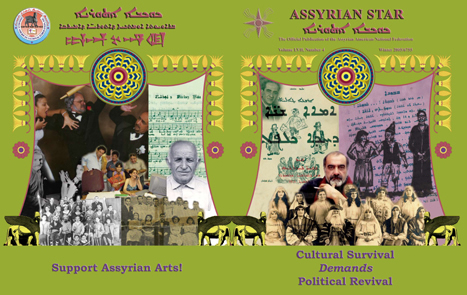 |
64 informative pages will be available in a few weeks
New 2006 subscribers receive the Theater Issue as Bonus
Subscription Rates:
USA ... $30
Canada ... $35
International ... $40
Institutional Subscribers ... $55
Send your check today to:
Assyrian Star
P.O. Box 2880
Worcester, MA 01613
Questions? theassyrianstar@aol.com
(Why not make a gift subscription to a loved one or friend?) |
The high priest was at first confused by the fact that I was visiting from Washington D.C. and yet spoke perfect Turkish; "where are you from?" he inquired. When I answered, saying that I was from Trabzon, an enxious look appeared on Metropolitan Aktas' face. But when I told him that I had come to learn about the Assyrian community, their lives and their relations with the Muslim communities in Mardin, he could see that I meant no harm and relaxed at once.
Metropolitan Aktas' trepidation owed to a confluence of straining coincidences. I was an unknown Turk from Trabzon, and just a day earlier his Catholic colleague had been killed by another Trabzonian. At the same time, the unfortunate "cartoons crisis," then at its peak with riots around the globe, was also making him anxious.
In the following days, we would both learn that the death of the Catholic priest was due to neither religious enmity against Christians in my home city, nor to Muslims' anger over the Danish newspaper cartoons that insulted the Prophet Muhammad and remains a serious issue on a global level. Actually, though we didn't know it yet, a 16 year-old who had a personal problem with the Italian priest was the killer. Indeed, the parishioners and clergy of the Sancta Maria Catholic Church, who I have known since my childhood, have always had good relations with the people of Trabzon and felt it safe to live in that city.
As we continued our conversation, both Metropolitan Aktas and his assistant expressed their deep unrest over the worldwide Muslim protests over the Prophet Mohammed cartoon. Even though they live in a country almost completely populated by Muslims, they had difficulty understanding the excessive reactions witnessed all over the world. They were shocked at the violence caused by Muslims in the name of defending the Prophet. "Are we not all humans seeking forgiveness?" stressed Mr. Gulten. "Why are we not forgiving each other? It is the Lord who is supposed to punish, not humans!"
The highly flammable issue would obviously make any religious minority in a Muslim country feel threatened. But for the Assyrians in Turkey, other problems are more realistically worrisome. The religious leaders lamented the fact that the state doesn't allow the Assyrians to teach their ancient language, Aramaic, to their community members or to educate their own clerics. Mr. Gulten, for example, had to learn Aramaic in Lebanon. And the young Assyrian who guided me through the monastery probably also had to learn Aramaic abroad. According to him, the few students who are sheltered in the monastery stay there only during the school term, and attend the Midyat public schools in Midyat; they cannot be educated by the priests.
Yet both Metropolitan Aktas and his assistant emphasized that the Assyrians are the people of Anatolia, and of the long-established Anatolian culture. "We are all living under the same flag," said Mr. Gulten. "We Assyrians, like all other Turkish citizens, are doing our military service for this country. My grandfathers too fought in Canakkale to defend this country. We are properly paying our taxes to the state."
For Mr. Gulten, this contribution simply means that Assyrians "should be allowed the same rights and benefits" as other Turkish citizens. "The Minister of Education in Sweden is an Assyrian who migrated from Mardin," Mr. Gulten noted. "If he can be a minister there, he should be able to be here in Turkey too."
Nevertheless, both Christian leaders emphasized that Turkey has democratized a great deal in recent years and that the democratization process is an irreversible one. Yet there are always provocateurs and events with the potential to derail that process. The Metropolitan and his assistant agreed that the murder of a Catholic priest could have a negative effect on Turkey's negotiations with the (Christian) EU member states. Interestingly, the Assyrians told me that they have been faithfully "lobbying" the European tourists who come to visit the monastery to take a positive view of Turkish EU membership.
Despite Local Interfaith Improvements, Problems Remain on the National Level
Despite the fact that there has not been any major conflict between the Muslim and non-Muslim communities in Mardin since the turbulent era of World War I, the peaceful relations between the Assyrians and the Muslim Kurds and Arabs have lately been internalized by all parts of the local society. An Assyrian man in Mardin told me that "up until [prominent Turkish Islamic scholar] Fethullah Gulen and the Journalists and Writers Foundation started the interfaith dialogue process in the mid 1990s, people around us used to merely view us as 'unbelievers,' just like [they refer to] the Yezidi. But after Gulen initiated dialogue with the Christian and Jewish leaders, people started to respect us as 'People of the Book.'"
Another Assyrian, Mr. Kolda, owns a bookshop in upper Mardin. "Fifteen or so years ago," he told me, "my friends and I were still being discriminated against by our classmates due to our Christian identity. They were calling as 'Gavur' –unbeliever. But since then, things have started to change."
In a similar vein, Mr. Gulten, the Head of the Midyat Assyrian Foundation, stressed that "Gulen's tears have been a shield for us here," referring to Fethullah Gulen's highly emotional public addresses which were marked by his own tears and calls for accepting people of different religions. Both the Assyrian Metropolitan and Mr. Gulten noted that the Interfaith Dialogue event organized by the Journalists and Writers Foundation a year ago at the historic Kasimiye Madrasa has dramatically changed the perceptions of the local people about the Christians in Mardin for the better. Several other Assyrians in Mardin also told me that the renowned Muslim scholar has initiated a process which cultivated new mutual understanding between the Muslims and non-Muslims in this corner of Turkey.
My recent experiences in Mardin reaffirmed my belief that Turkey should recognize that its minorities, such as the Assyrians, are the nation's very own people. As Gulten notes, they have fought to defend Turkey in the past, continue to serve in its military, and pay their taxes just like all the country's other citizens. In reality, they are more Turkish than British, French or Greek, Dutch or German or whatever else. However, Turkey's relative neglect in failing to address basic needs that stem from their religious identity has led them to sympathize more with the Assyrian diasporas in various countries in Europe and with their respective political circles.
This phenomenon has been witnessed also with Turkey's other Christian minorities, such as the Greeks and Armenians, groups that have much stronger diaspora communities and thus greater potential political influence. Indeed, the ongoing state ban on the operations of Istanbul's Greek Orthodox Chalki Theological School has been the cause of considerable tension between Turkey and the EU. Such incidents are pointed to be critics of Turkey as unfair restrictions on freedom of worship. Turkey's failure to meet the needs of the Christian communities living within the country could always be something that certain political circles in Europe might exploit to stalemate the EU membership negotiations.
Ye these communities, even if non-Muslim, are no less good citizens of the Turkish Republic than any Muslims in Turkey. Hence, the AK Party government should be generous in granting them rights that will enhance their feeling of belonging. The Assyrians whom I met, for example, would be delighted if they could teach their ancient Aramaic language and educate their own religious clerics.
Indeed, such a policy could even have positive economic impact on areas of country such as the southeast, which have historically been poor and rarely visited. By restoring Aramaic, Turkey could even become a meeting-place for Christians from around the globe, inspired to learn the ancient language of the Bible in one of the places where Christianity first took root and where the Assyrians still worship in their ancient style.
Turkey has a richly diverse culture and boasts a lot more to offer the world than most foreigners know about. Issues such as language and the Chalki Seminary should not be allowed to be divisive, politicized obstacles on the path to EU membership. It is crucial for the Turkish state to realize that the non-Muslim communities, be they Assyrians or another, are people of a common Anatolian culture. If the state does not protect their rights and better their living conditions, it is inevitable that outside interests would try to step in and interfere. Turkey as a whole can only benefit by being proactive rather than reactive in relating to its non-Muslim minorities.
 Mehmet Kalyoncu is a graduate student at Center for Eurasian, Russian and East European Studies at Georgetown University. His articles and reviews have been published in PINR-Power and Interest Report, www.balkanalysis.com, Caspian Business News, Zaman US Daily, American Journal of Islamic Social Sciences, and by Centro Argentino de Estudios Internacionales. His research interests include Turkish foreign policy, ethno-religious politics, and transatlantic relations. Mehmet Kalyoncu is a graduate student at Center for Eurasian, Russian and East European Studies at Georgetown University. His articles and reviews have been published in PINR-Power and Interest Report, www.balkanalysis.com, Caspian Business News, Zaman US Daily, American Journal of Islamic Social Sciences, and by Centro Argentino de Estudios Internacionales. His research interests include Turkish foreign policy, ethno-religious politics, and transatlantic relations.
Ignoring Christians and Ethnic Minorities in Arab Muslim Countries
A Well-kept Tradition at All Levels
Prof. Kamal Kolo
Belgium
In the name of Arab Heads of states: The Iraqi Christians do not exist!
It was amazingly strange to listen to the closing speech of Mr. Amro Moussa, the general secretary of the Arab countries league, when he addressed the heads of states and delegations during the Arab summit on 29 March 2006. As a General Secretary of this league, Mr. Amro Moussa is representing the general accepted policies of the Arab countries. His closing speech reflects the consent and approval of all attending delegations in addition to their line of thoughts.
In his reference to Iraq, Mr. Moussa strongly condemned in the name of the Arab league the bomb attacks on the Shiite Muslims Jaafar al-alaskry and Ali al-Hadi shrines in Samarra, to the north of Baghdad, referring to them by mentioning their explicit name, yet shamelessly falling short of mentioning the systematic campaign of terrorist bomb attacks on Iraqi Christian churches in Baghdad, Mosul and Basra, where tens of innocent Iraqi Christians – children, women and men – were wounded or killed and great property damage was caused. Mr Amro Moussa chose to use the vague and meaningless expression “and other places of worship” in a probable shy reference to “maybe” Christian churches. While the attacks on Shiite shrines are committed by rivaling factions of the same religion “Islam”, the attacks on the peaceful Christian churches and population were committed by Muslim terrorists, which put the dangerous significance of these latter attacks against the Iraqi Christians to a much higher level. Yet the heads of state in the Arab league and their speaker chose to look blindly at the plight of Iraqi Christians, not even dignifying their existence by mentioning their name.
Why does such a leader at such an occasion, where Arab heads of states are convening, choose to ignore the indigenous religious-ethnic minority that has been living in Iraq for thousands of years and thus to deny their existence? Why do the heads of states attending that meeting and listening to a closing speech accept this deliberate ignorance and denial of existence? Does this not reflect a pattern of state of mind and a way of thinking?
According to Mr. Amro Moussa, the Arab governments and people are seeking peace, justice and democracy and demanding the world to support their just cause; they condemned the Western “attack” on their Islamic religion and demanded to respect Islam and other religions in general. Yet again, how was it possible for a panel of heads of states to swallow the paradox that their speaker, while demanding respect and recognition from non-Muslim foreign countries for their belief and religion, explicitly fails to respect and recognize the Christian citizens of Iraq by denying their existence? This is, unfortunately, a recurring pattern in ancient and modern history of Arab Muslim countries. This time it was used on a pan-Arab panel. On a local level, in Iraq, and again amazingly and shamelessly, the Iraqi Muslim politicians, Shiites, Sunnites, Kurds and Turkmen, secular or religious and in spite of all their deep differences, they all agree about one certain phrase, when mentioning a certain Iraqi issue:
“The Iraqi people with all of their components, Arabs, Kurds, Turkmen, Shiites and Sunnites”.
The phrase stops at this point and the politician or Muslim religious man continues commenting on his topic. The expressions “Chaldoassyrians” and “Christians” have a too bitter taste to be pronounced. At the beginning of the period of the deposed dictator Saddam Hussein, the Chaldoassyrian people were considered as non-existing, too. They were deprived of their national ethnic and historical role in favor of one marginal component: Arab Christians and even this small role became obliterated during the sudden religious zeal of the dictator in his “campaign of belief” in the late eighties-nineties of the last century which gradually created and installed Islamic fanaticism in Iraq. Before of the fall of the dictator and his institutions, the Iraqi opposition was very keen to talk about democracy and the rights of minorities – whether Muslim, Christians, Sabaens, Chaldoassyrians, Turkmen or Shebecks – and to portray a multicolor picture for the future of Iraq. Disappointment and fear replaced hope, when it proved that those minorities or ethnic groups that had been suffering from dictatorship and persecution, after having gained power, started playing the same game against the Chaldoassyrians and Christians as before. It is the game of denial of existence, which is directed by a much worse strategy than before, because Islamic fanaticism, now well established in Iraq on governmental and institutional levels, calls for more radical types of denial of rights and existence for non-Muslim minorities that are considered by Islamic fanaticism to represent “citizens” not having equal rights to Muslims, and again starts the tale of “second degree citizens”. Words from the Islamic law, like Ahl al-Kitab (the people of the book) or Ahl al-Dhimma (the people of the vow), are fashionable in today’s Iraqi jargon as well as in religious speeches and literature. Under Islamic law, these minorities will never have the same rights as Muslims have, because that would be a breach of Islamic law. The prelude was the new Iraqi constitution and the preceding general elections, where the deprivation of rights of and denial of existence of Iraqi Christians as an ethnic and religious minority has become a policy of the governing Muslim majority that also dangerously injects fanaticism into simple ordinary Muslims on the streets. The persecuted people of yesterday have become the new persecutors. History shows that Islam and equal rights of minorities are on opposite sides. If the leaders of the Arab Muslim world are shying from recognizing Christian communities by not even addressing these communities by their names, the promised democracy, equality and social justice are but dreams or rather time buying terms, till the ultimate face of neo-Islamic dictatorship is well rooted in Iraq.
 Prof. Kamal Kolo is a scientific researcher at
the Vrije Universiteit in Brussels,
Belgium. Prof. Kamal Kolo is a scientific researcher at
the Vrije Universiteit in Brussels,
Belgium.
Freedom Betrayed!
Rev. Ken Joseph Jr.
Japan
“I told you so”, is the only way I can respond to the desperate situation of Abdul Rahman.
Abdul Rahman is fighting for his life in of all places, Kabul Afghanistan. Fighting for his life for what, one might ask.
Fighting for his life for the simple reason that he is a Christian..
We fought a war, `liberated` Afghanistan only to put together Constitution which forbids a person to believe anything other than the moslem religion..
What is more concerning is that the same group of people who have so messed up Afghanistan were also in charge of Iraq.
I know. I was there.
I was in Iraq during the time of Saddam and brought the first relief convoy into the country and served on one of the Constitutional committees.
The same foolish mistake that a group of misguided liberals foisted on Afghanistan they did in Iraq.
Just like Afghanistan the Iraqi constitution is a bomb waiting to explode.
Mr. Rahman has done nothing wrong. He simply changed religions. Of course it is a bit more complicated than that. There are moves afoot to somehow get him off the hook without changing the law.
The dirty little secret is that the whole co called `moslem world` is not in fact.
Mr. Rahmans case has finally brought into the open something all who have been in the Middle East or any so called `moslem` country know - nobody believes!
It is a system, much like its predecessor on the totalitarian world stage, Communism.
This is how it works. If you are born in a moslem country you are a moslem. Nobody asked you, nobody got your permission you are a moslem.
If one fine day you wake up and start asking the basic question `why`, you have two choices continue in the lie or die.
What happened in Iraq was very simple. A valiant, selfless group of men and women from countries throughout the world led by America and Britain liberated Iraq.
As in everything, though the devil is in the details - literally in this case.
The follow-up was done not by these heroic men and women but by a sinister group of people cobbled from throughout the world who had a different agenda.
First were the `kids` from the State Department. They messed things up for a very simple reason. They wanted jobs in an `anyone but Bush` administration.
They did everything they possibly could to make sure Iraq would fail so they could get a job in a Democratic administration.
I know. I was there.
The next group of people who betrayed the sacrifice of over 2,000 brave men and women were the `islamists` from throughout the world who worked in the Coalition Provisional Authority offering their expertise to the `nice guys` from the Military.
They had a different agenda. Just like they did in Afghanistan they took advantage of the niceness of the Americans to skillfully behind their backs turn the liberated Iraq into an even worse political nightmare - The Islamic Republic of Iraq.
I know. I was there.
The worst? Paul Bremer and his foolish assistant Dan Senor. These two men along with a vast group of others systematically delivered Iraq not to the longsuffering Iraqi people to finally be free but to the radical Islamists who had infiltrated every part of the Coalition Provisional Authority.
It is unconsienceable for over 2,000 young men and women to have given their lives to create The Islamic Republic of Afghanistan and the Islamic Republic of Iraq.
Did these brave men and women give their lives so that the most cherished human freedom - the freedom to believe is betrayed?
I think not!
While we still have chance the United States and every freedom loving country must immediately remove one sentence from their constitutions. The hated sentence that I along with many others fought day and night in Baghdad, in Washington, in London against.
I stood directly in front of Paul Bremer the head of the Coalition Provisional Authority who betrayed the Iraq people and demanded why he allowed the one sentence `Islam is the official religion of the country` to be put into Iraqis constitution.
His response? `The British have a Christian Constitution. The Iraqis should have an Islami one.`
This unconscionable betrayal of the poor longsuffering people of Afghanistan and Iraq must not be allowed.
Before it is too late and the greatest liberation of captive peoples since the end of the cold war results not in freedom but in the falling of the `Crescent Curtain` across two more countries just as the `Iron Curtain` fell a generation the world must speak out.
I will never forget looking into the eyes of soldier after soldier on a dusty, hot day in Iraq and asking the simple question `why are you here`.
To a man and women without skipping a beat they answered `just doing my job, sir. I want the Iraqi people to have what we have. `
I along with many others did our best to keep the hated sentence `Islam is the official religion of the nation` out of the Iraqi constitution but thanks to the antics of Paul Bremer, Dan Senor and the host of others who betrayed the trust of the Iraqi people they were in.
There is one and only one solution to the nightmare of Afghanistan and Iraq. Beginning with the families of the over 2,000 brave men and women who have given their lives so that Iraq and Afghanistan may be fee must immediately demand that the hated provisions and all other like them are removed from both the Afghan and Iraqi constitutions.
2,000 brave men and women did not shed their blood so that Abdul Rahman cannot be a Christian. We did not fight a war to create a moslem version of communism.
Ken Joseph Jr. is a columnist and has been in Iraq since the time of Saddam Hussein. He is an Assyrian, the original people of Iraq.
|
Bravo
Assyrians at Their Best
|
|
Form Follows Function: A Design of An Assyrian Identity
Artist: Sharokin Betgevargiz
April 14–30, 2006
Christopher Howard writes: "The best surprise was Sharokin Betgevargiz's politicized posters (she was in the graphic-design gallery) of the history of the Assyrian people in the twentieth century. Her use of images and text, both in English detailing the abuses heaped on the Assyrians by the Kurds and Arabs and in the Assyrian (Aramaic) language, whose beauty matches the calligraphy of Arabic and Hebrew words."
An Event Sponsored by Zinda Magazine
Opening Reception | Thursday, April 20, 6–8 pm
MFA Graphic Design Exhibition
Boston University Art Gallery | 855 Commonwealth Avenue, Boston
Hours | Tuesday–Friday, 10am–5pm
Saturday & Sunday, 1–5pm
|
|
Thank You
The following individuals contributed to the publication of this issue:
|
| Dr. Matay Beth Arsan |
Holland |
| Mazin Enwiya |
Chicago |
| Billy Haido |
Chicago |
| George Hanna |
United Kingdom |
| Nahrain E. Kamber |
California |
| Youkie Khaninia |
Arizona |
| Nineb Lamassu |
United Kingdom |
| Henry Morgenthau |
France |
| Mary Younan |
Canada |
|
ZINDA Magazine is published every week. Views expressed in ZINDA do not necessarily represent those of the ZINDA editors, or any of our associated staff. This publication reserves the right, at its sole discretion, not to publish comments or articles previously printed in or submitted to other journals. ZINDA reserves the right to publish and republish your submission in any form or medium. All letters and messages require the name(s) of sender and/or author. All messages published in the SURFS UP! section must be in 500 words or less and bear the name of the author(s). Distribution of material featured in ZINDA is not restricted, but permission from ZINDA is required. This service is meant for the exchange of information, analyses and news. Any material published in Zinda Magazine will not be removed later at the request of the sender. For free subscription to Zinda Magazine, send e-mail with your name, address, telephone number to: zcrew@zindamagazine.com.
ZINDA means "Spark of Fire" in modern Syriac (Assyrian); Zinda's Red Swoosh is a rendering of the seventh letter in the Assyrian alphabet, letter ZEN, and the first letter in the word "Zinda". For more information about the Assyrian culture and heritage write to Zinda Magazine.
Zinda Magazine™ Copyright © Zinda Inc., 1994-2006 - All Rights Reserved - www.zindamagazine.com |








